How to Start a Home Business (in 9 Steps)
- 7 months ago

Are you interested in starting a home business? Today, working remotely has become increasingly popular, which provides an abundance of opportunities for aspiring entrepreneurs.
Starting a successful home-based business can be overwhelming for many people just beginning their journeys. Our guide will help simplify the process with the essential steps and advice from small business owners who have already launched their business ventures from their residences.
We focus on helping you by discussing the following topics. Just click on a link to jump right to the home business information that interests you.

What are some advantages of a home-based business?
What are some disadvantages of a home business, factors to consider when starting a business at home, decide on a home business idea, write a home-based business plan, name your home-based business, get an llc for your at-home business, get business licenses for your home business, get a home business bank account, set up your home office, market your home-based business, serve your customers, what business can i start in my home, how do i start a small home-based business, can a tenant run a business from a rental property, what are the three general rules for qualifying your home office as a business expense, what percentage of utilities can i deduct for home business, what insurance do i need to run a business from home, home business faqs, balancing work and life at home.
- Expanding and scaling your home business
Ready to start your own business?
Get ready to start a small business at home.
Short summary
- Start a successful home-based business by carefully considering the type of business, creating a comprehensive plan, obtaining necessary permits and licenses, setting up an ergonomic workspace, marketing your venture effectively, and delivering quality products or services.
- Identify and focus on specialized market segments to help ensure success in any home-based venture. We show you how.
- Learn from inspiring success stories of individuals who have turned their ideas into thriving home businesses with hard work and the right strategies.
What is a home-based business?
Home-based businesses can be any size as long as the primary office is in the small business owner’s home. Small business owners have lots of options to choose from, including:
- Local service businesses
- Online and dropshipping businesses
- Freelance business ventures
Cristobal Mondragon started Queen Bee Cleaning Services as a home-based cleaning business. Now it makes over $1.5 million annually.
Check out Chris Mondragon’s FREE training to kickstart your own cleaning business. You can learn more about his inspiring journey by watching the interview below.

Read on for all the info you need to decide on a profitable home business idea that will work for you based on your skills and interests in combination with the resources available to you.
A home enterprise has several advantages over other small business ideas. Some of the best benefits of a home business include:
- Flexible schedule
- Lower startup costs
- Lower overhead costs
- Increased productivity
- More opportunities
- Less risk than renting a space
- More room for personal growth
- Tax deductions
- Great creative outlet
- Reduced personal expenses

When starting a small business from home, many business owners struggle with aspects like:
- Self-discipline required
- Paying attention to daily tasks
- Lack of privacy
- Separating work and home life
- Lack of space
- Not taken as seriously
- Lack of coworkers to collaborate with and learn from
- Feelings of isolation
- Procrastinating or overworking
Many small business owners will attend networking groups that help them overcome these common challenges. Start practicing good habits early to give your home-based business idea the best chance of success.
Starting a home business can be a huge advantage or disadvantage to a business venture. Ask yourself the following questions before starting your own business from home:
- What type of business suits your skills, interests, and resources?
- Do you have the space for your new business?
- Does your neighborhood have rules against certain small businesses?
- Will your family be supportive if you start a small business at home?
UpFlip Cautionary Tale
Many local business owners will find that their neighborhood has rules about running small businesses from home. I have lived in neighborhoods that don’t allow local service trucks, ones that won’t allow any small businesses, and ones that will only allow online businesses.
Make sure you understand the rules for your area before you start a service-based business from home.
How to start a home business
Successful home business ideas will normally follow a nine-step process for the best odds of success.
- G et an LLC for your at-home business
Keep reading to find some of the best home business ideas.
The first step in starting a home-based company is choosing a business idea. The best small business ideas from home normally fall into the following categories:
- Online Business Ideas
- Service Business Ideas
- Professional Services
We’ll provide you with some home business ideas for each of the three categories next.
Online business ideas

Many successful business owners choose to start an online small business. These make a great new business from home because they don’t require a lot of space and can be started with just the internet and a computer. Consider options like a:
Dropshipping business
This business idea requires creating an online store, finding dropshipping suppliers, and marketing their products. Learn more about dropshipping .
Affiliate marketing business

Small business owners can make a great living through affiliate marketing. You’ll need a marketing and sales plan because you’ll be paid on commission for selling other companies’ products.
Social media business
A social media manager uses digital marketing skills to help other businesses with marketing on social media. Make sure you don’t forget to build your own social media presence, too. Check out our interview with a successful social media manager.

Online store
Whether you have a subscription box business or a dropshipping business, you’ll need an online store. You could even buy an existing eCommerce business.
Check out more online business ideas .
Service business ideas
Check out some of the most popular service businesses that many small business owners run from home.
Car detailing business
Start a small business at home in the car detailing industry. You’ll be washing cars all day. This profitable business can make a ton of money.
Find out how Alan Tursunbaev turned an idea for a summer into a small business that brings in $50K per month.

House cleaning service
You can make a great living when you start a small business that’s a house cleaning service. Just ask Chris Mondragon, who started Queen Bee Cleaning, which makes nearly $2 million per year.

Dog grooming business
There are lots of businesses involving animals. You could start a pet-sitting business, a dog-walking business , or even a mobile grooming business.
Professional services
You can start a professional services small business at home. Consider one of the businesses below.
Renting commercial real estate
Real estate agents can make a great living and work from their own homes. Check out how Thach Nguyen has built a $100M real estate empire.
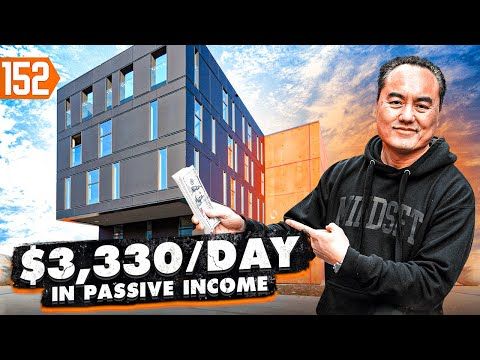
Consulting business
Whether someone needs a freelance writer, help with social media, inventory management, or financial projections, consulting is a great business.
Learn more about consulting businesses .
Perform market research
Once you have identified the best home business idea, it’s time to research how to make your small business idea work in more detail. This could involve conducting:
- Target market research
- Competitive analysis
- Research on barriers to entry
- Opportunities research
Once you’ve selected a small business idea, you should write a business plan.

Did you know a well-written business plan can help a company grow 30% faster than one with no business plan?
A detailed business plan is essential to any home-based venture’s success. It functions as a roadmap. Plus, the business plan details your goals, strategies, and financial outlook.
Check out our blog about business plans to download a business plan template and learn how to write your business plan.
Next, you’ll want to name your home-based business. Your business name is the foundation of your brand identity and will inspire your logo, marketing, and customer service.
Your unique business name should be easy enough to remember yet reflective of the values held by you and the company. Try our business name generator . You can find a small business name you love and check the availability on Name Cheap .

Setting up a limited liability company (LLC) for your home-based business is an essential step in safeguarding yourself and preserving your individual assets.
An LLC provides its owners with restricted liabilities, meaning you won’t be personally liable for any debts or duties of your organization. They’re easy to create and manage and offer tax benefits for successful businesses.
Establishing an LLC for your at-home business requires registering with the Secretary of State.
By forming this type of legal entity, you protect both your small business and your personal assets. You might also consider a different legal structure like a sole proprietorship or a corporation.
When starting a home-based business, it’s vital to acquire the essential licenses and permits. Depending on where you’re located and what kind of business you’re running, there will be various requirements for
- licenses such as general enterprise approvals
- sales tax documentation
- professional credentials
- any local requirements
Check local and state laws for any rules that might apply to your business. You may receive harsh penalties if you do not follow them. Make sure to keep track of your records and renewal periods, too.
All this needs to be done so that your company remains legit during its operations. Complying with legal requirements helps you avoid issues. Just ask Cristobal Mondragon:

For any home-based business, it is essential to open a bank account to separate business finances and personal ones. This simplifies tracking profits and expenses for bookkeeping purposes like tax filing.
To establish such an account, you’ll need your legal paperwork like your LLC registration, Tax ID, business licenses, and EIN (Employer Identification Number).
A dedicated credit card may be beneficial so that you can cover costs while your business builds credit history. All these play into managing your business finances. The better you manage the finances, the easier it will be to identify opportunities for improvement.

A dedicated home office is essential for managing your work and keeping up efficiency. Designate an area that provides privacy and limits disturbances so you can focus on running the business from your house. Comfort should be of utmost importance. Get an ergonomic chair and make sure the lighting facilitates whatever type of work you’ll be doing.
You’ll also want reliable, high-speed internet and software that will help you manage your business. The software you need will vary depending on the type of company you’re starting. Check out our HR blog for human resource provider reviews. Other software we suggest is:
- Google Workspace: Get a free 14-day Google Workspace trial .
- Quickbooks: Get 50% off Quickbooks and manage all your business expenses.
- Customer Relationship Management Software: There are a ton of options. Research the ones best for your industry. Two of the best are Monday.com and Asana .
You need an effective marketing strategy to launch and grow a home-based business. It’s essential to have insight into your target audience and research the competitive landscape. Reach potential customers on social media platforms, websites, or by partnering with related service providers.
Track and measure your promotional efforts using key performance indicators (KPIs) like web traffic or customer inquiries to decide where to allocate advertising dollars. Google Analytics is the tool most small businesses use to monitor their success at getting people to their websites.
Most importantly, marketing is a long-term game plan that requires consistency and dedication. Be patient and you’ll stand out from other home-based business owners.

Successful home-based businesses rely on providing their customers with stellar service. Depending on the type of business you start, this could be anything from offering personalized attention to delivering high-quality products. Practice operating on the old adage “Under-promise and over-deliver.”
Every happy customer will help build strong relationships that lead to loyalty and often positive word-of-mouth referrals. These can help you grow your at-home venture even faster.
Most businesses can be started from home as long as there are no homeowner association rules or local government prohibitions. You probably won’t be able to start home-based manufacturing or energy companies, for example.

Beginning a small, home-based business can be achieved by following the essential steps we’ve outlined. First, consider potential ideas and determine if they are suitable for working from your residence.
Consider profitability by creating an organized blueprint of how to move forward. Pick out the right company configuration, give it an apt name, register it with your state authority, and attain an applicable tax ID number and licenses to pave the way for a successful at-home venture.
You may be able to start a home business if you rent. You’ll need to:
- Check your CC&Rs or lease.
- Talk with your apartment complex manager, HOA, or landlord.
- Research zoning laws.
- Check for other laws prohibiting home businesses.
- Get a landlord permission letter for home business activity.
You may need a signed letter of authorization (see our sample) giving permission to use the property for business purposes.

According to the Internal Revenue Service , you have to meet three main criteria to claim a home office as a business expense:
- Exclusive and regular use : Your home office must be used exclusively for business purposes on a regular basis. It should not be used for personal activities.
- Principal place of business : Your home office should be the primary location where you conduct substantial administrative or management activities for your business.
- Meeting clients or customers : You must use your home office to meet your clients, customers, or patients, or the office space must be a separate area used exclusively for business purposes.
As long as your home office is exclusively used for work and is where you consistently do admin work, you will normally qualify to deduct 100% of direct business costs and a percentage of indirect but relevant household costs.
According to the Internal Revenue Service , you can deduct utilities using two methods:
- Simplified Method : Up to 300 square feet at $5 per square foot for a total of $1,500.
- Actual Expenses : This method allows you to use the same percentage of the home you actually use for business. Keep reading to find out how to calculate it.
Using actual expenses, you can either use the percentage based on square feet that are used exclusively for your business, or, if the rooms in your home are approximately equal in size, you can use the percentage of rooms used.
For instance, my office is approximately 15×15 feet or 225 feet out of 1,600 square feet in my home, which equals 14%. I can’t use the rooms method because they are not approximately equal. That calculation would suggest my office space is 33% of the home, which is not a fair representation.
My utilities are around $12,000 per year, which means I can claim 14% of that or $1,687.50 of my utilities. Given my mortgage is $1,700 monthly, 14% of my annual mortgage is $2,856, making my total home office claim $4,543.50—a far better deduction than the Simplified Method’s $1,500.

A home business will normally want a business owner policy (BOP) that bundles together three important coverage types:
- General liability insurance
- Commercial property insurance
- Business interruption insurance
It’s typically cheaper to buy a BOP compared to buying each policy separately and you can add additional coverage types as needed. Simply Business is a great place to get your business insurance because it compares rates from 16 major insurers.
While running a home-based business provides advantages, work-life balance may be compromised. You’ll want to create good rules for yourself to balance your personal time and work time. Here are some rules people suggest (and I wish I followed):
- Create a schedule for yourself with regular breaks and start-stop times. This helps keep your work from infringing upon personal time. My wife wishes I’d listen to this one.
- Maintain a separate space for your work so you can avoid being in it during personal time. This one is the easiest to follow.
- Schedule personal activities including exercise, hobbies, and dates. I try to do this one, but only exercise works flawlessly. My dog and I go for a mile walk every morning.
- Send your kids to boarding school if they start plying in your home office (jk).
Expanding and scaling your successful business

Once you start a small business at home, you’ll operate the business. As you build success, your business entity will likely need to hire more people, automate systems, or diversify income streams. Careful planning and research are essential for a successful business idea to grow. Some of the best ways to scale a business include:
- Introduce new services and products .
- Add another market segment .
- Explore partnerships .
- Upgrade technology .
- Add staff members. (This might mean you need to change the legal structure or move the business out of your own home.)
- Add new locations .
- Create a franchise .
- Increase the budget for your marketing and sales plans .
Now you know how to choose a business idea, create a business entity and legal structure, and some of the unique features of a home business. It’s up to you to take the time to create a solid business plan, build your business model, and market your business.
What business will you start from home?

Brandon Boushy
Brandon Boushy lives to improve people’s lives by helping them become successful entrepreneurs. His journey started nearly 30 years ago. He consistently excelled at everything he did, but preferred to make the rules rather than follow him. His exploration of self and knowledge has helped him to get an engineering degree, MBA, and countless certifications. When freelancing and rideshare came onto the scene, he recognized the opportunity to play by his own rules. Since 2017, he has helped businesses across all industries achieve more with his research, writing, and marketing strategies. Since 2021, he has been the Lead Writer for UpFlip where he has published over 170 articles on small business success.
Related posts

- April 11, 2024
Best Networking Groups for Small Business Owners

- April 5, 2024
Best Franchise Under $50K (2024)

- April 3, 2024
How to Start a $1M/Month Tow Truck Business
Join the discussion cancel reply.
Save my name, email, and website in this browser for the next time I comment.
This site uses Akismet to reduce spam. Learn how your comment data is processed .
2 thoughts on “How to Start a Home Business (in 9 Steps)”
Looking for a long term career at an organisation where I can put my skills effectively.
Your articles are too damn long and nothing new. Wtf. Cut that crap in 1/4.
Compare listings
Reset Password
Please enter your username or email address. You will receive a link to create a new password via email.
How to Start a Home-Based Business and Work From Home

8 min. read
Updated February 20, 2024
Did you know that 50% of U.S. entrepreneurs start their business at home? And for good reason. A home-based business can provide a quicker startup path, greater flexibility, and lower startup costs.
However, you still have to follow the same startup steps as every other business to succeed. Plus, there are additional considerations due to you working from home.
This guide will cover the specific steps for starting a home-based business. We will not go in-depth on steps that apply to all business types and recommend checking out our full startup guide to dig deeper.
1. Questions to ask before starting a home-based business
- Can you focus and stay motivated?
When working from home, you’ll be dealing with far more distractions—household chores, pets, TV shows, and that comfy bed calling for you to take a nap.
- Do you have a support system?
Whether it’s a mentor, family, or some other form of support—you should have someone who can help when you get stuck. Ideally, this person will have remote business experience and better relate to your situation.
- What are your goals?
Why are you starting a business? Why does it have to be from home? What is your long-term vision? You may need to rethink starting a remote business, depending on your answers.
- Is your home suitable for running a business?
You need to determine if your current home setup is built for running a business or if you need to make changes to create a suitable workspace.
- Can you balance work and personal life?
As a business owner, work-life balance is not guaranteed. Long hours spent pouring through your numbers, finishing orders, etc. Balance can be even more difficult for home-based businesses where your office is always just a step away.
These questions are specific to starting a home-based business. They don’t cover your other considerations when becoming a first-time entrepreneur.
For additional guidance, check out what to do before starting a business .
Dig deeper:
5 myths about working from home
Don’t let these common misconceptions about working from home set your new business up for failure.
Tips to run a successful home-based business
Learn what experienced entrepreneurs recommend you focus on when starting an at-home business.
Brought to you by
Create a professional business plan
Using ai and step-by-step instructions.
Secure funding
Validate ideas
Build a strategy
2. Identify a business idea that works remotely
There are specific qualities that make for a good business idea. The idea solves a problem, shows clear market demand, and fits your goals.
However, even if an idea meets the criteria above it doesn’t mean it will work as a home-based business. Here are additional qualifications you should consider:
- Digitalization: Can the business be operated entirely online or with minimal physical interaction?
- Independence: Can the business be run independently without needing a large team or physical infrastructure?
- Scalability: Can the business be scaled up without significant physical infrastructure?
- Supply chain: Does the business require minimal physical inventory or a supply chain you can manage remotely?
Remember, you must conduct thorough market research and speak directly with your potential customers. An idea may look good on paper and meet the requirements to function remotely, but it won’t be viable if there’s no demand.
Check out our complete guide on idea validation for more information.
Online business ideas
A fully online business can be a great option to start from home. Here are a few options to consider.
Subscription service business ideas
While we may be past the gold rush for this business type—the right subscription service could still capture consumers’ attention.
- 3. Write a business plan
Writing your business plan will help you think through every aspect of your home-based business. It’s where you:
- Describe your product or service .
- Document your research .
- Create a financial plan .
- Outline marketing and sales efforts .
- Provide an overview of your operations , business structure, and team .
You should address everything in this list to create a complete business plan. And since you’re starting from home, pay special attention to:
- Operations:
What does the day-to-day look like, and can it work in your home office, garage, or shed?
- Financials:
How does being remote impact startup costs, and how do you intend to scale to achieve profitability?
Is that possible from home, or must you invest in another space?
- Product/service description:
What about your product or service allows it to be sold from the comfort of your home? Is there a competitive advantage for doing so?
While having a detailed business plan is essential, it can be helpful to start with a one-page plan . It’s quicker, easy to update, and provides a working overview of all the above components.
Plus, you can always expand it into a more traditional plan later.
Need help to write your plan? Check out our business planning guide for step-by-step guidance.
Dig deeper: How to build remote work into your business plan
- 4. Understand the legal requirements
A home-based business has to follow all of the same legal requirements as every other business, including:
- Choosing a business structure
- Registering your business name
- Applying for a state and federal tax ID
- Obtain the right licenses and permits
There are also some unique legal considerations you’ll need to account for:
- Home business permit:
Some local governments require home-based businesses to obtain a particular home business permit.
- Zoning laws:
Check your area’s zoning laws to ensure that running a business from home is allowed.
- Homeowners Association (HOA) rules:
If you live in a community with a homeowners association (HOA), check the HOA rules to see if there are any restrictions on running a business from home.
- Business insurance:
While not a legal requirement, you should have some business insurance. Some home insurance policies do not cover home-based businesses and may need to purchase additional coverage.
5. Figure out your startup costs and finances
Starting a home-based business is often more cost-effective due to eliminating rent and other associated expenses.
Depending on your business, you may have virtually no startup costs . But that doesn’t mean you can skip out on budgeting and forecasting .
At a minimum, you should account for:
- Your home office setup
- Technology and equipment
- Legal expenses
- Marketing/advertising
Remember, the startup costs for a home-based business can vary widely depending on the nature of your business and your circumstances. Creating a detailed budget and forecasting revenue and expenses is essential for sufficient funds.
Lastly, don’t wait to separate your personal and business finances . You may find it tempting to intermix funds when working from home, but this will make performance harder to track and potentially lead to legal issues. All it takes to get started is opening a business bank account .
Dig deeper: Do you save money by working from home?
- 6. Set up your workspace
You need to choose a dedicated space to run your business. Somewhere with minimal distractions and a way to separate your work and home life.
Ideally, this room can become a dedicated office. The reality is not everyone has that much extra space. If so, you must set strict boundaries for how and when to use the space.
Once you have a space in mind, make the necessary adjustments to turn it into a productive work environment. Here are a few things to consider:
- Introduce bright, natural lighting: Proper lighting reduces eye strain and helps create a pleasant working environment. Natural light is best but experiment with different light tones to find what works best for you.
- Get creative with storage: Utilize storage solutions like floating shelves, vertical file cabinets, or desks with built-in storage to maximize space and organize files and supplies.
- Prioritize comfort: Invest in a good chair with proper back and arm support, and consider a stand-up desk to alternate between sitting and standing.
- Upgrade your equipment: At a minimum, you need a high-speed internet connection. You’ll likely need additional tools and services to run your business, but these entirely depend on your business idea.
How to set up a home office on a budget
If you’re trying to avoid overspending on your office setup, here are a few tips for making a useful space without overspending.
Home office essentials for entrepreneurs
What are the necessities for a working home office? Here are a few areas worth investing in.
7. Manage your time
Improving your time management and focus will be an ongoing process. But, there are a few ways to set you, and any employees, up for success.
- Use project management tools:
Utilize online tools like Trello or Asana to organize tasks, set deadlines, and monitor progress.
- Set clear expectations:
Communicate tasks, deadlines, and expectations to yourself and your team. Setting deadlines and making regular updates help keep everyone on the same page.
- Encourage regular breaks:
Short breaks throughout the day can improve productivity. Encourage your team to take regular breaks to clear their minds and recharge.
- Regularly communicate:
Use communication tools like Slack or Zoom to stay connected with your team, contractors, or vendors to facilitate collaboration.
- Avoid multitasking:
Focus on one task at a time to ensure quality work and avoid mistakes.
Try this work-from-home checklist
Follow these steps to optimize your time when working from home.
How to stay productive when working remotely
Are you struggling to focus on your business while at home? Here are ten ways to increase productivity.
How to manage and motivate remote workers
Are you bringing on remote workers or contractors? Learn how to help them stay productive and find motivation outside of an office setting.
9 tools to manage your remote team
If you’re struggling to track work and communicate with your growing remote team—check out this roundup of tools.
Learn more about what it takes to start a business
By following these steps, you’ll be well on your way to starting a home-based business. But there is far more you can learn about starting a business.
Check out the following guides to learn how to promote and grow your burgeoning business:
- How to market your business
- How to put the right team together
- Set up your business finances
Clarify your ideas and understand how to start your business with LivePlan
Kody Wirth is a content writer and SEO specialist for Palo Alto Software—the creator's of Bplans and LivePlan. He has 3+ years experience covering small business topics and runs a part-time content writing service in his spare time.
.png?format=auto)
Table of Contents
- 1. Questions to ask before starting
- 2. Identify an idea that works remotely
- 5. Figure out your finances
- 7. Manage your time
- More about starting a business
Related Articles

3 Min. Read
Can I Expense This? An Accountant Explains the World of Write-Offs

9 Min. Read
Going Beyond the Napkin: How Do You Know If Your Idea Is Any Good?

8 Min. Read
How to Start a Food Pantry in Your Community

How to Quit Your Day Job and Work For Yourself
The Bplans Newsletter
The Bplans Weekly
Subscribe now for weekly advice and free downloadable resources to help start and grow your business.
We care about your privacy. See our privacy policy .

The quickest way to turn a business idea into a business plan
Fill-in-the-blanks and automatic financials make it easy.
No thanks, I prefer writing 40-page documents.

Discover the world’s #1 plan building software
- Auto Insurance Best Car Insurance Cheapest Car Insurance Compare Car Insurance Quotes Best Car Insurance For Young Drivers Best Auto & Home Bundles Cheapest Cars To Insure
- Home Insurance Best Home Insurance Best Renters Insurance Cheapest Homeowners Insurance Types Of Homeowners Insurance
- Life Insurance Best Life Insurance Best Term Life Insurance Best Senior Life Insurance Best Whole Life Insurance Best No Exam Life Insurance
- Pet Insurance Best Pet Insurance Cheap Pet Insurance Pet Insurance Costs Compare Pet Insurance Quotes
- Travel Insurance Best Travel Insurance Cancel For Any Reason Travel Insurance Best Cruise Travel Insurance Best Senior Travel Insurance
- Health Insurance Best Health Insurance Plans Best Affordable Health Insurance Best Dental Insurance Best Vision Insurance Best Disability Insurance
- Credit Cards Best Credit Cards 2024 Best Balance Transfer Credit Cards Best Rewards Credit Cards Best Cash Back Credit Cards Best Travel Rewards Credit Cards Best 0% APR Credit Cards Best Business Credit Cards Best Credit Cards for Startups Best Credit Cards For Bad Credit Best Cards for Students without Credit
- Credit Card Reviews Chase Sapphire Preferred Wells Fargo Active Cash® Chase Sapphire Reserve Citi Double Cash Citi Diamond Preferred Chase Ink Business Unlimited American Express Blue Business Plus
- Credit Card by Issuer Best Chase Credit Cards Best American Express Credit Cards Best Bank of America Credit Cards Best Visa Credit Cards
- Credit Score Best Credit Monitoring Services Best Identity Theft Protection
- CDs Best CD Rates Best No Penalty CDs Best Jumbo CD Rates Best 3 Month CD Rates Best 6 Month CD Rates Best 9 Month CD Rates Best 1 Year CD Rates Best 2 Year CD Rates Best 5 Year CD Rates
- Checking Best High-Yield Checking Accounts Best Checking Accounts Best No Fee Checking Accounts Best Teen Checking Accounts Best Student Checking Accounts Best Joint Checking Accounts Best Business Checking Accounts Best Free Checking Accounts
- Savings Best High-Yield Savings Accounts Best Free No-Fee Savings Accounts Simple Savings Calculator Monthly Budget Calculator: 50/30/20
- Mortgages Best Mortgage Lenders Best Online Mortgage Lenders Current Mortgage Rates Best HELOC Rates Best Mortgage Refinance Lenders Best Home Equity Loan Lenders Best VA Mortgage Lenders Mortgage Refinance Rates Mortgage Interest Rate Forecast
- Personal Loans Best Personal Loans Best Debt Consolidation Loans Best Emergency Loans Best Home Improvement Loans Best Bad Credit Loans Best Installment Loans For Bad Credit Best Personal Loans For Fair Credit Best Low Interest Personal Loans
- Student Loans Best Student Loans Best Student Loan Refinance Best Student Loans for Bad or No Credit Best Low-Interest Student Loans
- Business Loans Best Business Loans Best Business Lines of Credit Apply For A Business Loan Business Loan vs. Business Line Of Credit What Is An SBA Loan?
- Investing Best Online Brokers Top 10 Cryptocurrencies Best Low-Risk Investments Best Cheap Stocks To Buy Now Best S&P 500 Index Funds Best Stocks For Beginners How To Make Money From Investing In Stocks
- Retirement Best Gold IRAs Best Investments for a Roth IRA Best Bitcoin IRAs Protecting Your 401(k) In a Recession Types of IRAs Roth vs Traditional IRA How To Open A Roth IRA
- Business Formation Best LLC Services Best Registered Agent Services How To Start An LLC How To Start A Business
- Web Design & Hosting Best Website Builders Best E-commerce Platforms Best Domain Registrar
- HR & Payroll Best Payroll Software Best HR Software Best HRIS Systems Best Recruiting Software Best Applicant Tracking Systems
- Payment Processing Best Credit Card Processing Companies Best POS Systems Best Merchant Services Best Credit Card Readers How To Accept Credit Cards
- More Business Solutions Best VPNs Best VoIP Services Best Project Management Software Best CRM Software Best Accounting Software
- Manage Topics
- Investigations
- Visual Explainers
- Newsletters
- Abortion news
- Coronavirus
- Climate Change
- Vertical Storytelling
- Corrections Policy
- College Football
- High School Sports
- H.S. Sports Awards
- Sports Betting
- College Basketball (M)
- College Basketball (W)
- For The Win
- Sports Pulse
- Weekly Pulse
- Buy Tickets
- Sports Seriously
- Sports+ States
- Celebrities
- Entertainment This!
- Celebrity Deaths
- American Influencer Awards
- Women of the Century
- Problem Solved
- Personal Finance
- Small Business
- Consumer Recalls
- Video Games
- Product Reviews
- Destinations
- Airline News
- Experience America
- Today's Debate
- Suzette Hackney
- Policing the USA
- Meet the Editorial Board
- How to Submit Content
- Hidden Common Ground
- Race in America
Personal Loans
Best Personal Loans
Auto Insurance
Best Auto Insurance
Best High-Yields Savings Accounts
CREDIT CARDS
Best Credit Cards
Advertiser Disclosure
Blueprint is an independent, advertising-supported comparison service focused on helping readers make smarter decisions. We receive compensation from the companies that advertise on Blueprint which may impact how and where products appear on this site. The compensation we receive from advertisers does not influence the recommendations or advice our editorial team provides in our articles or otherwise impact any of the editorial content on Blueprint. Blueprint does not include all companies, products or offers that may be available to you within the market. A list of selected affiliate partners is available here .
How to start a small business at home in 2024
Blair Travers

Sierra Campbell
“Verified by an expert” means that this article has been thoroughly reviewed and evaluated for accuracy.
Published 8:07 a.m. UTC Feb. 16, 2024
- path]:fill-[#49619B]" alt="Facebook" width="18" height="18" viewBox="0 0 18 18" fill="none" xmlns="http://www.w3.org/2000/svg">
- path]:fill-[#202020]" alt="Email" width="19" height="14" viewBox="0 0 19 14" fill="none" xmlns="http://www.w3.org/2000/svg">
Editorial Note: Blueprint may earn a commission from affiliate partner links featured here on our site. This commission does not influence our editors' opinions or evaluations. Please view our full advertiser disclosure policy .

PeopleImages, Getty Images
Starting a small business at home can help you turn your passions, skills or ideas into financial prosperity. There are some unique perks and challenges to consider when deciding to start a home-based business.
You’ll also want to have a solid plan and follow some key steps to get your business off on the right foot. It’s helpful to know where you can find ideas, answers to your questions and other resources you need to run an at-home business successfully.
Should you start a business at home?
There are many factors to consider when deciding to start a small business at home. On the one hand, it’s important to make sure there is demand for your business. On the other hand, you want to be able to handle the amount of business you receive. Gauging things like demand, profit margins and the ability to scale your business early on can help you avoid trouble down the road.
Across the country, at-home businesses make up a large portion of small businesses. C.E. “Tee” Rowe is the president and CEO of America’s Small Business Development Centers (SBDC), which provides free or low-cost support for small businesses in partnership with the U.S. Small Business Administration. “Here at America’s SBDC, we have seen an uptick in home-based businesses that started during the pandemic but continues to date,” said Rowe.
Our Partner
Chase business complete checking®, monthly maintenance fee.

New customers who open a Chase Business Complete Checking® account can earn a $300 bonus.
How to get the bonus
To get the bonus, your business must:
- Open a new Chase Business Complete Checking account, deposit at least $2,000 of new money into the new checking account within 30 days of enrolling, maintain a balance of at least $2,000 in the account for 60 days from the offer enrollment and complete at least five qualifying transactions within 90 days of offer enrollment. Qualifying transactions include debit card purchases, accepting card payments through QuickAccept®, Chase QuickDeposit, ACH credits, credit and debit wires and Chase Online℠ Bill Pay.
After you complete these steps, Chase will deposit the bonus cash into your new account within 15 days.
Pros of a home business
Here are some key benefits to starting a business at home:
- Increased flexibility: Set your own hours, freeing you up for other commitments as needed.
- Less commuting: Save time and money by skipping the drive to work.
- Comfortable work environment: Design your workspace how you want it. After all, it is your home.
- Money-saving perks: Pay lower startup costs compared to larger businesses by avoiding costs like renting retail or office space. Take advantage of tax breaks for at-home businesses.
- Reduce risk: Protect yourself by limiting your liability and avoiding the cost and risk of maintaining commercial space.
- Rewards for your hard work: Work hard for your business, and your business reaps the benefits instead of some other employer.
Cons of a home business
These are some of the disadvantages of starting a business at home:
- Limited space: You give up part of your home, and even then, you may still need more space for your business.
- Distracting work environment: Crying babies, barking dogs and loud neighbors can all be distracting when running a business at home.
- Professional boundaries: Some people may feel awkward about meeting to discuss business at your home or a public location.
- Increased mental health risks: Running a home business can feel isolating for some. A lack of social interaction, time outside, work-life balance or effective time management can also threaten mental health.
- Growth restrictive: If your home-based business scales too rapidly, you may outgrow your workspace quickly. In this situation, success creates a problem for home businesses to solve.
- Increased costs: Whether you’re paying new employee salaries or wages or forking over more money for higher utility bills, you may feel the financial squeeze.
Featured LLC service offers
Zenbusiness.

Via ZenBusiness’ website
Free version available
Lowest published package price

Via LegalZoom’s website
Northwest Registered Agent

Via Northwest’s website
7 steps to start a home business
After considering the pros and cons, does the idea of taking the reins and starting a home business appeal to you? You’re not alone.
“When we work with individuals seeking to start a home-based business, it is frequently based on a desire to control their own circumstance and success, which are great reasons, but it always needs to be thought out carefully,” Rowe explained.
Planning is key. From creating a business plan and determining your business structure to securing funding and setting your marketing strategy, there’s a lot to think through. Follow the steps below to get on the right track to starting a small business at home.
1. Find your niche
Plenty of successful at-home businesses arise from emotion: a passion to do what you love, a frustration with the status quo or excitement to seize on a timely opportunity.
If you’re struggling to find your niche, ask yourself:
- What do you love to do that others may find challenging?
- What is a need that no business currently has the right solution for?
- What are you good at? What do people ask for your help with?
- What high-demand skills or services do you have to offer?
2. Draft a business plan
Having a business plan is essential for running your business effectively. As Rowe pointed out, “Every business needs a solid, comprehensive plan to guide them to success. That plan needs to focus on skills, finance, revenue and marketing.”
A business plan outlines the direction of the business — its goals, strategies, structure, ways of measuring success and plans for dealing with things like change and risk. Simply put, it’s the roadmap to success for your business.
When creating your business plan, include key sections such as an executive summary, a business description, market analysis and financial projections. For more on what to cover, check out this step-by-step guide to drafting a business plan .
3. Select a business structure
According to the IRS, the most common business structures are sole proprietorships, partnerships , corporations and limited liability companies (LLC) . Each business structure comes with its own set of operational, legal, financial and tax considerations.
A sole proprietorship is a business owned and operated by a single individual, while a partnership is jointly owned by two or more individuals who share responsibilities.
In contrast, corporations — like C corporations and S corporations — are independent legal entities. C corporations limit shareholder liability but are highly complex. S corporations feature pass-through taxation, distributing income (and losses) to shareholders.
While sole proprietorship is a common structure for just starting out, LLC is another popular option for at-home businesses. It combines elements of a corporation and a partnership, offering limited liability to its members and the flexibility of pass-through taxation. Members of an LLC can choose to be taxed as a sole proprietorship, partnership, C corporation or S corporation.
4. Register your business and get an EIN
After you choose a business structure, you’ll need to register your business with state and federal governments. Select a business name , pay fees and provide required documents, which vary by state.
After getting registered with your state, you can then apply for an Employer Identification Number (EIN) from the IRS. Once you’re approved, you’ll receive this unique nine-digit number that is essential for all sorts of business purposes, from filing your taxes to hiring employees.
Not all businesses need an EIN, such as sole proprietors and single-member LLCs with no employees.
5. Get any required licenses and permits
Depending on your industry and federal, state and local requirements, you may also need to obtain licenses and permits for your business.
Here are some examples of licenses and permits you may need, depending on your business:
- Occupational, professional or trade licenses.
- Online business permits.
- Sales tax permits.
- Health department permits.
- Safety permits.
- Home-based child care licenses.
- Zoning, signage, environmental and other permits to operate an at-home business, as required by local government, HOA or deed restrictions.
6. Obtain funding for your business
Many owners fund their businesses using their own savings. Self-funding is a viable choice if you can get up and running without much money, can come up with the needed funding from your own accounts or can ask for help from family or friends.
You can also apply for a business loan . Banks will likely want to see a rock-solid business plan, strong financial projections, good personal and/or business credit history and any collateral you’ll use for your loan. If you are a good candidate for lending, make sure that shows in your application so that you can get the best funding and terms for your business.
If you don’t have much personal or business credit history, it may be easier to get a business credit card . This gives you benefits like payment flexibility, credit card rewards and essential early or emergency spending power. It will also help your business establish or strengthen its credit so you can get favorable terms on future loans and other credit.
7. Launch and market your business
You’ve planned out your business, defined its structure and gotten your business registered, licensed, permitted and even paid for. Now it’s showtime. For many who seek to start a small business at home, the launch is the most exciting part of the journey. You are now ready to conduct business.
It’s also important to get others excited about your small business — and keep them engaged. Here are some of the most common marketing strategies for small home-based businesses:
- Social media marketing: Reach potential customers on platforms like Facebook, Instagram, TikTok and X (formerly Twitter) by sharing engaging content and updates.
- Business website: More than just a place to sell your products or services online, your business website should help users find what they want to meet their needs. It should also help achieve business objectives by offering features like payment services or e-commerce functionality .
- Advertising: Platforms such as search engines and social media can help you reach your target audience.
- Content marketing: Write blog posts, produce videos or create helpful graphics to explain what your business offers and to establish trust and authority.
- Email marketing: To keep business coming back, build an email list to communicate using promotions, newsletters and updates.
- Word of mouth: In the early stages, many small home-based businesses rely on word of mouth. You can also ask for customer reviews on platforms like Google and Yelp.
Weigh the costs and benefits when deciding on your marketing plan, so you choose what’s best for your business.
Top home business ideas
Check out these home business ideas to find the right fit for you:
- Retail: Sell products you make — including crafts and customized gifts — or resell products you get for less than what you pay for them.
- Case-based services: Open up an in-home daycare, provide home-based care for adults or even take care of pets by offering pet sitting and mobile grooming.
- Events: Plan weddings and events. Create the perfect look as a makeup artist or stylist. Play music in a band or take your place on the 1s and 2s as a DJ.
- Art and creative services: Capture the moment as a photographer, or maybe you’d rather bring your vision to life as an artist. More of a words person? Write, edit or translate content.
- Education: Teach the next generation how to do math, play an instrument or learn a new language. Provide adults with specialized training in arts and crafts, life coaching or test preparation.
- Health and wellness: Become a personal trainer to get people in the best shape of their lives or a mental health counselor to help them find their inner peace.
- Home and real estate: Transform homes by organizing, decorating or even staging. Produce virtual home tours for real estate agents, or become a realtor yourself.
Resources to start a business
For more resources and guidance on how to start a small business at home, check out these guides and articles:
- Follow our step-by-step guide on how to start a business from the ground up.
- Learn how to start an LLC if that’s your chosen business structure.
- Discover how to start a business with no money so funding doesn’t hold you back.
- Skip the overhead that comes with brick-and-mortar stores and find out how to start an online business .
- Explore options to accept payments online and start making money in your sleep.
- Find the cheapest payroll services to pay your employees and contractors.
- Build a successful business by attracting loyal, repeat customers.
Frequently asked questions (FAQs)
The cost of starting a business at home varies widely and depends on several factors. Some businesses, including sole proprietorships, can get away with paying little to no money to start their business. Other home-based businesses, including those with manufacturing or inventory expenses, could have considerably higher startup costs.
Yes, you can use your home address to register a business. However, you’ll want to make sure that usage does not go against local laws, HOA bylaws or property covenants. It’s also a good idea to check with your mortgage and homeowners insurance companies to make sure that running a business out of your home does not introduce unforeseen headaches.
Blueprint is an independent publisher and comparison service, not an investment advisor. The information provided is for educational purposes only and we encourage you to seek personalized advice from qualified professionals regarding specific financial decisions. Past performance is not indicative of future results.
Blueprint has an advertiser disclosure policy . The opinions, analyses, reviews or recommendations expressed in this article are those of the Blueprint editorial staff alone. Blueprint adheres to strict editorial integrity standards. The information is accurate as of the publish date, but always check the provider’s website for the most current information.

Blair Travers is a business writer and content strategist with over a decade of experience breaking down complex problems to help businesses move forward with confidence. He brings a wide range of technology, banking and retail expertise. Blair enjoys helping businesses figure out complex processes and make choices that are right for them. His work has been published in U.S. News & World Report and Carfax.
Sierra Campbell is a small business editor for USA Today Blueprint. She specializes in writing, editing and fact-checking content centered around helping businesses. She has worked as a digital content and show producer for several local TV stations, an editor for U.S. News & World Report and a freelance writer and editor for many companies. Sierra prides herself in delivering accurate and up-to-date information to readers. Her expertise includes credit card processing companies, e-commerce platforms, payroll software, accounting software and virtual private networks (VPNs). She also owns Editing by Sierra, where she offers editing services to writers of all backgrounds, including self-published and traditionally published authors.

How to start a small business: A step-by-step guide
Business Eric Rosenberg
- Credit cards
- View all credit cards
- Banking guide
- Loans guide
- Insurance guide
- Personal finance
- View all personal finance
- Small business
- Small business guide
- View all taxes
You’re our first priority. Every time.
We believe everyone should be able to make financial decisions with confidence. And while our site doesn’t feature every company or financial product available on the market, we’re proud that the guidance we offer, the information we provide and the tools we create are objective, independent, straightforward — and free.
So how do we make money? Our partners compensate us. This may influence which products we review and write about (and where those products appear on the site), but it in no way affects our recommendations or advice, which are grounded in thousands of hours of research. Our partners cannot pay us to guarantee favorable reviews of their products or services. Here is a list of our partners .
Home Business Ideas: 40 Remote Jobs to Explore in 2022

Many or all of the products featured here are from our partners who compensate us. This influences which products we write about and where and how the product appears on a page. However, this does not influence our evaluations. Our opinions are our own. Here is a list of our partners and here's how we make money .
Working remotely and starting businesses from home have grown in popularity over the past decade. Currently, in the United States, millions of self-employed individuals have acted upon home business ideas and work regularly from their home.
There are plenty of compelling reasons to want the flexibility that working from home can offer. If a change in lifestyle is what you’re after, then you’ll want to take a close look at your skills and interests to figure out which of the many work-from-home jobs suits you. To help you in your exploration, we’ve gathered this list of 40 of the best home business ideas.

Home business ideas
Any office worker can probably tell you that they've had a daydream about quitting their job and starting their own business. Luckily, in this technological age, this dream can more easily become a reality. If you have a computer and internet connection, there are home business ideas aplenty, including those with low startup costs (if any) and flexibility for stay-at-home parents.
Here are 40 of the best home business ideas to consider:
1. Freelance writer
If you’re a great writer, then you could make a great freelance writer. And best of all, freelance writers work from all over the world. Whether you want to sit in your neighborhood cafe all day or country-hop all year, this job could apply to you.
Of course, successful writers need to have a firm grasp on grammar and tone, superb editing chops and the ability to do their own research and synthesize content that they might be unfamiliar with. It could help if you become an expert in a few different fields, like technology or small-business finance, and it’s always important for all freelancers to know how to market themselves and network with potential customers.
You might be asked to write anything from a blog post series to an industry white paper, website copy or email newsletters. The more you’re familiar with, the better off you are.
And finally, don’t forego the possibility of writing your own e-books to sell on Amazon and similar websites. With basically zero publishing costs and low design costs, this is another way your writing can benefit your bank account directly. (You could even write an e-book about freelance writing — the possibilities are endless.)
2. Virtual assistant
If all of your friends know you as “the really, really organized one,” then being a virtual assistant might be the home business idea for you.
When busy executives reach a point in their careers where they can't manage all the calls, emails, appointments and smaller responsibilities on their plates, that’s where you come in. As a virtual assistant, you would use your phone, email, computer skills and any number of online tools and applications to handle their online calendars, schedule appointments and meetings, make reservations, purchase tickets, set up reminders, organize events, file documents and more.
If this kind of work isn’t your thing, then it might sound a bit unglamorous. But if you’re the type of person who color-codes their planners and sends out Google calendar invitations for coffee dates, then being a virtual assistant could be a fun and fulfilling job — that you can do from home.
How much do you need?
with Fundera by NerdWallet
We’ll start with a brief questionnaire to better understand the unique needs of your business.
Once we uncover your personalized matches, our team will consult you on the process moving forward.
3. Researcher and fact-checker
From perusing old academic essays or case files to analyzing bibliographies or carrying out some market research, you can establish yourself as a professional researcher and fact-checker. Various types of businesses within several different industries need researchers and fact-checkers. Establishing a niche may help you better market your services.
You need to be organized, meticulous and skilled at communication. If that sounds like you, then add this to your personal list of home business ideas.
4. Social media manager
Today, every business, brand and public figure needs social media to engage with their audience, stay relevant and boost brand awareness.
And as it turns out, many companies pay pretty highly for people to manage their social media accounts well. If you can stay on brand, share content appropriately and reply to customers intelligently — while getting those precious likes, hearts, retweets and upvotes en masse — then you could be a killer social media manager.
5. Blogger and affiliate marketer
While managing a blog in and of itself won’t net you any money — in fact, it’ll cost you to purchase a domain, upgrade the appearance and run marketing campaigns — there are a few ways for you to monetize your blog. You could offer up advertising space, which is a useful but typically minor revenue stream, but a lot more money is often found in sponsorships and affiliate marketing.
Affiliate marketing, a sort of product placement, will let you receive payment from companies in return for advocating for their goods and services. Although this might sound a bit iffy, if you truly do recommend that your readers try out these products, then it doesn’t need to come across as sales-y or insincere. Readers will understand that you need to make money somehow, and many will appreciate your recommendations if they’re accurate.
6. Freelance designer
If you’re more of a visual person, then the freelance lifestyle can still work wonders. Try your hand at designing posters, flyers, or online advertisements for companies that don’t have the time or talent to do this work themselves.
As a freelance designer, you’ll build an online reputation and eventually have control over the projects and timelines you manage. Try out Behance and other freelance design sites to check out your options.
7. Freelance coder
Becoming a freelance coder is an especially great home-based business idea since it’s already a very commonplace gig. Whether you want the flexibility of being your own boss, enjoy taking on a wide diversity of projects rather than working with a single company, or prefer to travel instead of staying in one place, you've got many reasons to pursue freelance software development — even though technology companies and startups offer their own perks as well.
8. Online thrifter
Have a unique eye and the salesman’s pitch down to a science?
If so, you might want to consider running your own online thrift shop. Whether you focus on fashion specifically, another category of product, or prefer to amass collections of interesting items from all over the internet (but especially eBay), there’s always a strong demand for items with a story .
Give your store a compelling, memorable identity, and it will be seen as much more than a simple consignment store.
9. Data entry guru
It might not be the most lucrative or stimulating job in the universe, but data entry can certainly give you the funds you need to work from home or abroad. Plus, data entry jobs rarely require a lot of time or attention, unlike many on this list of home business ideas. You can listen to your favorite podcasts or audiobooks as you work your own hours.
Moreover, since all you need for data entry is a computer, this is certainly a home business idea with low startup costs — if you already own a laptop and have a reliable WiFi connection, you're pretty much all set.
10. College consultant
If you’re a top-notch editor with a deep understanding of how college admissions works — including standardized test preparation, personal statement requirements, supplemental essay requirements, applicant statistics and even financial aid — then you might be able to snag a rather well-paying job as a college consultant. Some families are willing and able to pay, and pay well, to make sure their kids submit the best possible applications to their dream schools.
This is by no means an easy job, as it requires a lot of knowledge and skillsets, but it can bring in a lot of cash for a home-based business.
11. Online tutor
Whether you’re an expert in a certain subject matter, like calculus or biology, or you’ve secured top scores on standardized tests, like the SATs or MCATs, you may be able to share that knowledge with current students looking to get an edge.
So if you have a passion for teaching, are up to date on the formats and policies of the tests you plan to instruct students on, and feel comfortable handling the content, then it might be time to start an online tutoring business.
And just like with the rest of these online home business ideas, you can easily service customers over the phone or, in this case, a video conferencing program like Skype or Zoom.
12. Translator
If you know multiple languages, then this is the home-based business idea for you. As a translator, you can service businesses and clients in a number of different ways. You can translate articles, press releases, e-books or other written work. You might also translate videos, podcasts or contribute to international closed captions for a variety of visual products. Moreover, you might connect with international businesses to serve as a translator for meetings or phone calls.
With experience in more than one language and access to the internet, you'll be surprised about how far-reaching your home translating business can extend.
13. Cybersecurity consultant
With even the biggest businesses around the world being subject to data breaches, cybersecurity is more important than ever. If you have experience with software and IT, a remote job as a cybersecurity consultant might be one of the best home business ideas for you.
From the comfort of your home, you can work with different companies to test their programs, software, backups, firewalls, encryption and generally assess potential threats to their network and advise them on the best cybersecurity practices. Although this may be one of the home-based business ideas on our list that requires the most training and education, it can be a highly lucrative position if you already have the knowledge, or are willing to work to obtain it.
14. Transcriptionist
Can you type extremely quickly while listening to someone talk? If the answer is yes, you might consider transcription services. Like data entry, this might not be the most exciting of our home business ideas but is certainly low-cost, flexible and you can get started very easily. There are all kinds of companies out there who hire freelance transcriptionists, as well as specific services that employ individuals to transcribe audio for various clients.
15. Travel planner
If you frequent websites like TripAdvisor and Yelp and are well-traveled yourself, you might extend your travel expertise to others as a home-based travel planner. You can use your experience to plan and book trips for your clients — manage hotel reservations, flights, excursions, create itineraries and offer tailored recommendations.
For families looking to go on a two-week vacation or couples planning their honeymoon, hiring someone to handle the details, big and small, of their trip, can be invaluable. Plus, in working with different hotels, resorts and vacation attractions, you'll start to build relationships with the staff — and possibly, receive discounts or perks that will make traveling on your own even easier (you might even start a travel blog while you're at it).
16. Fundraiser
If you have any prior experience managing campaigns and events, or simply have an electric personality, you might consider starting a freelance fundraising business. As a fundraising consultant, you'll have the opportunity to market for a business or cause and talk to prospective donors about how and why they should contribute to your campaign.
This home business idea is great for individuals with a background in nonprofit or government work, as well as former marketers or salespeople. If you have excellent people skills and a drive for meeting goals and getting results, this can easily be the right business for you.
17. Medical billing and coding
Although this job may require some form of medical background or schooling, it can be easily profitable and sustainable. Medical billing and coding connect health care providers, patients and insurance companies. As a medical biller and coder, therefore, you would work with patient records to determine the correct codes that are then verified by doctors and sent to insurance providers.
This career is a great business idea for nurses looking for a change; they can easily utilize their prior experience and relationships to succeed in this kind of self-employed role.
18. Video producing
With the prevalence of video in social media and marketing, the need for video producers and experts has only grown in recent years. Even if you don't have prior experience cutting and editing video, this is an online-based home business idea that you can easily learn and teach yourself with classes, tutorials and general guidance from the online video community.
Moreover, video production can transcend a number of different industries, styles and goals. As a video producer, you'll not only have the flexibility of working from home on a variety of projects, but you'll also have the ability to utilize your creativity on a daily basis.
19. Publicist
Looking for a way to combine your public speaking, communication and writing skills? You might consider serving as a freelance publicist or public relations consultant. You can greatly appeal to smaller businesses or individuals who can't invest in full PR teams or staff, but still need this kind of assistance for their organization.
As a freelance publicist, you may handle press releases, emails, social media — essentially, assisting with all facets of your clients' public-facing presence.
20. Customer service representative
Many companies now outsource their customer service to home-based representatives, so you should have no shortage of potential clients in this field. After all, any service- or product-based organization is more than likely going to have some kind of customer support need.
As a customer service representative, you'll be able to work with individuals online or over the phone and talk them through any issues they're having. If you have a communicative and approachable personality, this could be a great option for you.
21. Pet sitter or dog walker
As a pet sitter or a dog walker, you'll get to spend time with other people’s animals while they’re at work or on a trip. Simply follow your client's instructions, as well as your own experience and expertise, to provide care and comfort to these pets. It’s an easy way to get paid, especially if you’re an organized and trustworthy individual with a reputation for or history of animal care.
22. Arts and crafts master
Consider putting your knack for arts, crafts and design to use as the manager of an online store. So long as you believe your creations can find a market and sell at a profitable price, there’s very little stopping you from signing up as a seller on a site like Etsy and carving out your niche. While it might be a tough business, there’s plenty of wisdom out there to learn from.
23. Accountant
If you’re currently an accountant, transitioning to remote work might be as simple as letting your clients know that you work remotely now for reasons of convenience or perhaps hanging your own shingle out to start your own firm. On the other hand, if you’re looking to enter the industry (virtually or not), you should be aware of the training and certifications necessary.
24. T-shirt designer
The U.S. apparel industry is a $225 billion dollar market, and as it turns out, the T-shirt business is relatively quick, easy and painless to get into.
So if you’re interested in entering the eclectic and diverse T-shirt business with an idea or brand of your own, rejoice: This is certainly one of the best business ideas for setting your own hours and calling your own shots.
25. Cleaning service
If you love — or just don’t mind — cleaning up after others, then starting a cleaning business could give you the flexibility you want without forcing you to sit at a computer all day long.
However, this is an endeavor that could certainly grow into a much larger company if you’re successful, meaning that, eventually, you’d probably have to get an office and hire staff.
26. Massage therapist and wellness expert
Over the past decade, the massage therapy industry has grown nearly 20% with no indication of stopping. If this statistic interests you, then you might want to consider entering this burgeoning field.
After getting your massage therapy certification, along with the business license and massage equipment needed to work from home, you can turn your house into a local massage parlor for clients to come to, relax and improve their health and wellness. Plus, you could combine your massage therapy with a more holistic wellness practice or a nutritionist practice — but make sure to check your state’s licensing laws before offering dietary advice or supplements to customers.
27. Personal trainer
As a personal trainer, you could make house calls, visit a gym or let clients come to you (if you have the necessary equipment). You need to be very knowledgeable about everything from proper exercises for different body types to how to motivate people who want to get healthy. You should feel comfortable getting close to your clients in order to learn what works best for them.
Although a certification may not absolutely be necessary, it’s not a bad idea to find out if you can get one in your state before starting up, just in case.
28. Interior decorator
If you have an eye for composition, organization and feng shui, think about starting an interior design business . Partner with local furniture stores and design businesses (with your clients’ knowledge) to get good deals, help decorate public spaces and business interiors as well as houses and apartments, and let everyone in and outside your network know that your services are available.
29. Event planner
Everyone plans events — but not everyone lives and breathes it. Do you love coordinating food and drinks, invitations, scheduling conflicts, music, gifts, goody bags and every other aspect of the parties or events you’ve set up?
From birthdays to weddings, corporate get-togethers and local conventions, the world is your oyster when it comes to events to plan. If you’re passionate about logistics, then this could be the home business idea for you.
30. Caterer
If nobody you know can stop talking about your cooking, then maybe it’s time to charge for your services and talent and start a catering business .
While you won’t necessarily be able to do all of your catering work from home — you may need to use a commercial kitchen and will likely have to hire some part-time employees to help during events — much of the organization, planning, marketing and actual business work can be done wherever you like.
31. Bed-and-breakfast manager
This idea is for the folks who live in popular tourist locations, or would like to move to one. With some preparation, planning, tidying, cooking and a dash of advertising (made easier by services like Airbnb), you can convert your home into a bed-and-breakfast for weary travelers to rest in.
Keep in mind that you need spare bedrooms or a guest house for your customers, and you might want to invest in your cooking and decorating skills to leave a lasting positive impression. Good reviews go a long way in booking out your house for the future.
32. Florist
With a green thumb and a knack for crafts, you might consider opening a floral business to sell flowers and floral arrangements. Depending on your location, you could grow your own flowers, sell and arrange them at home; or, you can outsource the flowers, but still manage the whole of your operations from your own house.
33. Day care manager
Provided you have space, you can start a day care business by supervising a few children during the day — and expanding with staff to accommodate more kids as your business expands.
A day care can be an important business in a local community, especially if your town doesn't already have one. Plus, if you have any experience with teaching or kids, getting into this business will be quick, easy and rewarding.
34. Rideshare driver
Although not home-based per se, becoming a rideshare driver, with Uber or Lyft can offer the same flexibility and freedom as a business that's physically based in your home. As a rideshare driver, your business will more or less be based in your car, and you'll be able to choose your own hours and be your own boss. With the popularity of ridesharing apps continuing to grow, there's no shortage of clients looking for rides, especially if you live in a tourist area or near a big city.
35. Photographer
By starting your own home photography business, you can manage the operational side of your endeavor right from home and travel as needed to meet clients. If your home is particularly picturesque, you might even consider bringing clients there to take photographs or set up a home studio for portraits.
If you want to venture into event photography, you can market your services and look for clients who need professional photography for weddings, graduations, engagements or other events.
36. Landlord
If you have an extra room or guest house on your property, you might consider renting the space — or even investing in a separate property that you can market to renters. As a landlord, you'll be responsible for the upkeep of the property and dealing with any issues that arise with your renters, but you'll generally have flexibility in your business and be home-based.
37. Hair stylist or makeup artist
Are you the person that your friends come to for help with hair and makeup? If so, you might decide to start a home-based salon or makeup artistry business. You can set up a small place in your home with good lighting and the tools you'll need to service your clients, as well as create an on-the-go kit to offer hair and makeup in your clients' homes.
You may find that your hair or makeup business is particularly busy during prom and wedding season, which will be the perfect time to continue to market to new customers. If you have downtime during seasons, you might consider starting a hair or makeup blog or YouTube tutorial channel as well.
38. Eldercare
If you're passionate about helping people and have any experience in personal care, you might consider starting an eldercare business. Nursing homes can be expensive and people are often hesitant to put their family members in full-time care facilities. Therefore, you might decide to offer freelance care, traveling to your clients' homes and caring for them as needed. Keep in mind, you'll want to make sure you have any certifications and the proper training you need.
With the growing popularity of craft and local beers, you might consider brewing beer in your own home. Although this home business will require research, training and equipment, it can be sustainable if your properly market and sell your product.
Or, if you're particularly attracted to the brewing process but don't want to get involved in all of the other areas involved in selling beer, you might look into contract brewing, where you help beer companies make and package their beer. Either way, this can be a great hands-on business, especially if you like experimenting and figuring out how the best beer is made.
Even with all of the different brands and clothing stores out there, people are still going to have those moments where they need a piece of clothing fitted or repaired. If you have any skill with a needle or sewing machine, you might want to open up your own home tailor shop. As a tailor, you can perform fittings and alternations for dresses and suits, as well as repair damaged clothes.
Moreover, you might find there's a market for sewing personalization that you could capitalize on as well, especially for sports teams uniforms, wedding gifts, company swag and more.

Start Your Dream Business
Tips for starting a home-based business
Owning a home-based business is a dream that many people have. The good news is, the process is much more straightforward than you might think. If you're already working from home, contracting or freelancing, you may be able to turn your marketable skills into your own home business. Consider the following steps:
1. Craft a business plan
All businesses are born from a solid plan. Your home-based business is no different. Decide your company's purpose, figure out what service or products you will offer and set measurable targets and goals. You should also determine business financing options if you need initial capital to get started. Your business plan may adapt as your company evolves, but it's the foundation your company will grow upon.
2. Carve out a dedicated workspace
If you're new to working from home, you may think the kitchen table or couch makes for a perfect workspace. Unfortunately, when you're running your own home-based business, you may need a designated space to manage your business. This space does not have to be large and can always grow with time, but it should be separate from daily distractions in your home. If you don't have a second room to utilize, consider setting up your workspace in a spare bedroom or another less-trafficked room. You'll appreciate the privacy when you're taking work calls.
3. Choose a business entity
When planning home business ideas, you need to decide what type of business you want to form. Each business type has its own advantages and disadvantages, so make sure you do thorough research before deciding on one.
You don't have to form your own business to work from home, but doing so can be beneficial when filing your taxes and separating personal and business expenses.
The bottom line
If you're exploring small-business ideas from home to find the one that will be cost-effective, fit your skills and inspire you—we hope you found the right idea on our list; or, if not, you at least came up with a brilliant home business idea of your own.
The market for working from home (and home-based businesses) continues to grow, especially in small communities and niche markets. If you're intent on shifting to a home-based career, then, the opportunity is out there to start, sustain and even grow your own business.
On a similar note...

- Search Search Please fill out this field.
- Building Your Business
- Becoming an Owner
- Business Plans
How to Write a Business Plan for Your Home Business
If you fail to plan, you plan to fail. Don't handicap your home business by not taking the steps to create a business plan.
Business Plan
A business plan is a written blueprint for your home business. Business plans are essential for getting a business loan, but even if you don't need outside funding, they are a valuable tool to helping you set goals in your home business, understand what you need to do, and anticipate future growth.
Types of Business Plans
- Formal business plans : These plans are detailed documents, usually prepared for the primary purpose of securing outside funding for the business.
- Informal business plans : These plans are used primarily by the business owner as a road map to success. It might be so informal as to be handwritten notes, or a bit more comprehensive typed out plan.
Whether formal or informal, when properly written and maintained, business plans provide a means to help you stay focused on the tasks that build a profitable home business.
Do you need a business plan?
If you intend to secure outside funding for your business, you'll need a formal business plan.
However, even if you're starting small or have your own resources to fund your business, a business plan isn't required, but it can greatly improve the chances that your home business will succeed.
The U.S. Bureau of Labor Statistics estimates that as many as 30% of all small businesses fail in the first two years. Those statistics can be very frightening. After all, why would you want to spend time and effort, as well as risk your own money, when there is only one chance in ten your business will survive?
There are several reasons why small and home businesses fail, but proper planning can help overcome them all. A business plan can help you:
- Get clear on your goals
- Develop a deep understanding of your market
- Organize the day-to-day activities of your home business
- Understand your current financial situation
- Make important management and financial decisions about your home business
- Set a starting point to measure growth
Writing a Business Plan
The answer to this question depends on two key factors.
Is the Business Plan for Internal Use or External Use?
If you're not using the business plan to get a loan or find investors, you can write it yourself. If you're trying to secure outside funding, professionals who write business plans for a living bring a lot to the table even if you only get outside help to review the plan to make sure your bases are properly covered in the document. Additionally, business plans need to be edited and proofread for grammar and good sentence structure. Well-written business plans increase the chances of securing needed outside funding.
How Are Your Writing Skills?
If you're a good writer you can probably write a business plan yourself, at least with some assistance. Software and samples are available to help prepare business plans. Additionally, the SBA is a terrific resource for guiding you through the process. If you haven't already, you'll want to take their online Develop a Business Plan Workshop to get started. While you can easily learn how to write a business plan yourself, you will still benefit from having someone else read through your plan and you may still need outside assistance, such as a CPA to create your financial documents and/or a market research firm to develop statistics about your markets.
Whether you decide to hire someone who writes business plans, write it yourself, or use software, you still need to take an active role in the process. Whoever writes your plan needs accurate information for each section of the document and a clear understanding of your business.
Gathering the information is also of great benefit to you because it helps you understand your business and what you need to do in order to succeed, and it gives you a clearer picture of your competitors and your market.
If the business plan's purpose is primarily for your own use you can follow a simple home business plan outline.While general guidelines are available, if the plan is being written primarily to secure outside funding, such as a small business loan, it's not a bad idea to see in advance if the financial institution has any specific requirements it likes to see in its loan applications and business plans. The basic outline of the business plan includes:
- Executive Summary – A high-level overview of the document that is placed first in the finished document but that needs to be written last.
- Company Description - A history and description of your company.
- Products or Services - Information on the products or services you plan to offer and how they compare to your competitors products or services.
- Market Analysis – A description of your market, your niche, and the demand for your product or service (supported by documentation). The percentage of market share you envision and conclusions of any marketing research data.
- Marketing and Sales Strategies – How you will promote your business, how you will get your product or service to your customers, the costs for distribution and promotion, and how you will measure the effectiveness of the methods you plan to use.
- Organization and Management – The legal structure of your business ( sole proprietorship , LLC , C corporation , S corporation , etc.), who your key players are, who is responsible for what and how much they will cost your business.
- Financial Data – Your balance sheet , a breakeven analysis, an income statement and a statement of cash flows . You'll want to include both historical financial statements and forward-looking financial statements.
- Funding Request – This is the section when you'll be requesting funding for the business. If you are not seeking outside funds right now, you can leave this section out.
- Appendix – Contains supporting information, such as resumes, details of market research findings, estimates, and all other documentation required to support what's contained in the body of the business plan.
What to do with the business plan once it's done?
Once you've completed the above information, you need to use your business plan as you organize you daily to-dos and make decisions about your business. Note that your business plan isn't a static document carved in stone. As you build your business, you may find that you need to make adjustments or changes depending on the market, your ability to reach your goals, and changing trends in the marketplace. As a result, it doesn't hurt to review and revise, if necessary, your business plan every six months or so.
Keeping your business plan current offers some important benefits, such as:
- If you ever need to apply for additional funding through either SBA loan programs or other sources of private funding, up-to-date information will already be available. When it comes time to submitting updated business plans, you'll save time and money.
- It helps you stay focused the important elements of your business, and avoid getting bogged down in busy work, or shiny objects.
It can help you identify areas you need to improve in or can expand.
U.S. Bureau of Labor Statistics. " Table 7. Survival of private sector establishments by opening year ." Accessed April 16, 2021.
10 Profitable Home Business Ideas to Make Money From Home (2024)
Looking for work-from-home business ideas? Good idea.
Renting commercial real estate, warehousing, or office space can put massive financial strain on a new business. In contrast, many home business opportunities are quick and easy to start.
But there are so many home-based business ideas out there — which one should you consider?
Some work-from-home business ideas require an upfront investment to get the ball rolling — and some require just $39. Also, some home-based businesses are easier to start if you can turn a spare bedroom into an office or workshop — others are easy to run from your dining table.
So, what's the best work-from-home business idea for you? In this article, we'll explore 10 of the best home business ideas that you can start quickly and easily.
(Disclosure: This website is a part of Shopify inc. media properties. Although we strive to publish objective, accurate, and factual content, this article may contain biased opinions.)

Start selling online now with Shopify

10 Profitable Home Business Ideas You Can Start Today
While there are countless ways to start a home-based business, here are 10 of the most approachable home business ideas to consider:
- Sell handmade products
- Purchase products in bulk and sell them online
- Start a dropshipping business
- Start a print-on-demand business
- Purchase an existing ecommerce business
- Start a subscription box business
- Teach online classes
- Start a service-based business
- Sell digital products online
- Build an online following that you can monetize

1. Sell Handmade Products
Do you love to create things at home? If you love crafts or art, why not sell your handcrafted products online? For example, you could:
→ Click Here to Launch Your Online Business with Shopify
- Make candles
- Create jewelry
- Create pieces of art
- Make homemade food
- Design and sew clothing
- Knit clothes and blankets
- Craft wooden furniture
Whatever you like to create, selling handmade products is a great way to turn a passion into a work-from-home business opportunity.
There are two main ways to start selling handmade products online:
- Sell through a marketplace such as Etsy
- Create your own online store using a platform like Shopify
That said, you could also sell via both channels with Shopify's Etsy integration .
If this home business idea has caught your eye, start by writing a list of everything you could create. Then, do some online research to see what other people are selling.
2. Start a Dropshipping Business From Home
If you like the idea of running an online store, but you're not sure what to sell, consider starting a dropshipping business from home. Plus, this is a home business idea with low startup costs.
Dropshipping is a type of ecommerce in which sellers don't need to purchase or store the products they sell. Instead, sellers partner with dropshipping suppliers who manage the inventory and ship products directly to customers on the seller's behalf.
Check out the image below to see the dropshipping business model in action:
Pretty cool, right?
The best part is that starting a dropshipping business from home is as easy as 1-2-3 thanks to dropshipping apps like DSers .
Here's why: You can use DSers to start selling dropshipped products online today — just sign up for Shopify , install the Dsers app , and search for products to add to your store.
3. Start a Print-on-Demand Business From Home
Similarly, if you like to create art and eye-catching designs but don't want to make products yourself, you could start a print-on-demand business from home.
Print-on-demand is a type of dropshipping in which you can sell products that are customized with your designs, such as:
- Apparel: T-shirts, hoodies, leggings, yoga pants, etc.
- Footwear: Sneakers, boots, flip flops, etc.
- Accessories: Jewelry, watches, phone covers, bags, bottles, face masks, notebooks, stationery, etc.
- Homeware: Mugs, towels, bedsheets, cushions, blankets, throws, etc.
- Art: posters, wall hangings, stickers, magnets, etc.
- Electronics: Headphones, speakers, etc.
Check out some common print-on-demand products in the image below from Printful :
To start this work-from-home business idea, sign up for a Shopify account and choose a print-on-demand app to install , such as:
4. Purchase Products in Bulk and Sell Them Online
Another way to sell products online is to buy products in bulk — also known as 'wholesale' — and sell them individually.
When you purchase products in bulk, you can get a lower cost-per-unit than if you buy them individually. Then, when selling the products one-by-one, you're able to increase the prices to create a profit margin.
So, where can you buy fantastic goods in bulk?
Start by researching products on business-to-business (B2B) ecommerce marketplaces like Alibaba and DHgate.com .
You can then create an online store with Shopify to sell your products to consumers.
Plus, instead of selling products individually to consumers, you could also purchase products in bulk and sell them to retailers in smaller quantities — this is called wholesaling.
5. Purchase An Existing Ecommerce Business
If you don't have the time — or the inclination — to set up a home-based business from scratch, you could always buy an existing home business opportunity via the Exchange marketplace .
This website facilitates the sale of ecommerce businesses in a range of niches. Plus, you can buy an established business or a relatively new business.
This may sound pretty complicated at first, but in practice, it's pretty straightforward.
Start by browsing the home business opportunities listed on Exchange. When you find a business you like, consider reaching out to the buyer to find out more information. Then, if you decide to purchase the business, Exchange will facilitate the… well, exchange.
On the other hand, if you want to start businesses but you're not interested in growing them to their full potential, you could create and sell ecommerce businesses on Exchange.
It's also possible to 'flip' businesses — or to put it another way, buy a business, improve it, and then sell it for a profit.
6. Start a Subscription Box Business From Home
Why sell one product at a time when you can sell a bundle of products every month to the same person? This is what subscription box businesses like Birchbox do.
Plus, Google Trends shows how interest in subscription boxes has boomed in recent years:
This home business idea is a fantastic way to grow a sustainable income, thanks to the recurring revenue generated by ongoing purchases.
You can sell almost anything as a subscription box, too, such as:
- Fashion accessories
- Indie records
- Homeware and kitchen gadgets
- Information products (such as up-to-date industry reports)
- Food, such as snacks or sauces
What's more, you don't necessarily have to sell products — you could also rent them. For example, Haverdash rents clothes.
To get started with this home business idea, sign up for Shopify and use the built-in subscription management tools.
7. Teach Online
If you have in-demand skills or knowledge and a talent for teaching, consider sharing your knowledge via online video calls
Popular subjects taught online include languages, maths, science, and business. But there are no limits to what you can teach, so you could also teach things like music, sewing, or even DIY!
According to PayScale , most online teachers earn between $10.18 and $39.87 per hour, depending on their level of experience.
There are countless online teaching marketplaces that will help you to connect with students and manage your classes, such as:
Plus, there are plenty of feature-rich online teaching platforms to help you create incredible virtual learning experiences, such as:
8. Start a Service-Based Business From Home
The need for digital services is rampant — from designers and developers to digital marketers and doodlers, there's a need for virtually every talent.
If you're wondering what service you can offer, here are 20 service-based home business opportunities to consider:
- Graphic designer
- Web designer
- Transcriber
- Marketing writer
- Resume writer
- Photo or video editor
- Social media manager
- Digital advertising manager
- Data entry clerk
- Virtual assistant
- Career coach
- Marketing consultant
- Management consultant
- Finance consultant
- Calligrapher
Some of these home business ideas offer more income potential than others. So, make sure to do your research to choose the right service-based home business idea for you.
To get started, consider signing up to a freelance marketplace like People Per Hour , Upwork , or Fiverr .
You could also create a website and then find clients independently by networking and pitching.
9. Sell Digital Products Online
If you've mastered a particular skill or subject and don't want to teach online or provide a service, you could package your knowledge and experience in a digital product.
Selling digital products is a fantastic home business idea because — like dropshipping — there's no need to source or manage inventory or ship products to customers. Plus, once you've created a digital product, it doesn't cost anything to replicate.
So, what types of digital products can you sell? Here are 20 to consider:
- Written templates (résumés, scripts, marketing emails, etc.)
- Spreadsheets
- Illustrations
- Graphic templates
- Editing presets (for videos, images, or audio)
- Online tools
- Membership sites
- Audio (music, samples, podcasts, etc.)
- Research (statistics, reports, etc.)
For example, Gabriella and Andrew Morrison sell courses and house plans to help people build tiny houses on their website Tiny House Build .
10. Build An Online Following That You Can Monetize
If you love creating content, you could build an online following around a particular topic or niche and monetize your audience.
If you're interested in this home business idea, you need to choose a way to build an audience. Now, there are many ways to create a following online — for example, you could:
- Grow an Instagram following
- Build a YouTube audience
- Create a blog and grow your readership
- Grow a Twitch following
- Build a TikTok following
Once you have a relatively large following or plenty of website traffic, how can you make money? In essence, there are three ways to monetize an online audience:
- Brand sponsorships: Get paid to promote a company's products (also known as ' influencer marketing .'
- Affiliate marketing: Promote a company's products or services and earn a commission.
- Sell products: Create and sell physical or digital products to your audience.
For example, Adam Enfroy built a blog that reviews many software products. In the image below, you can see his blog post reviewing the Shopify platform:
This blog post contains Adam's affiliate link to Shopify . As a result, whenever someone reads the post, clicks the affiliate link, and signs up for Shopify, Adam will receive a small sales commission.
FAQs About Home Business Ideas
- How do I start a small home business?
Wondering how to start a small home business? Here are 8 steps to starting an online business:
- Choose an online business model that suits your business
- Identify your target market
- Identify the problem that your business is solving
- Know your competitors and how you are different from them
- Choose a sourcing strategy that your customers will love
- Set up your payment system so you can get paid
- Test your business idea in the simplest way possible
- Create your marketing strategy to start promoting your business
- How do I make money from home business ideas?
There are many ways that online home business ideas make money. You could charge per product, create subscriptions, build affiliate links, and so much more. Once you have decided your business model you can start brainstorming the exact home business idea for you and get started.
Choose A Home-Based Business Idea and Get Started Today
There are tons of profitable home business ideas out there to choose from. So, if you're wondering, "What business can I start from home?" Here are 10 of the best home-based businesses to consider:
- Sell products you make at home online
- Start dropshipping products with Dsers
- Sell print-on-demand products
- Buy products in bulk and sell them online
- Purchase an existing business on Exchange
- Sell subscription boxes
- Teach online
- Sell digital products
- Build and monetize an online following
When deciding which home business opportunity to pursue, try to capitalize on any skills and experience you have — and consider following your interests or passions.
Which home business idea has caught your eye? Let us know in the comments below!
Want to Learn More?
- How to Use Shopify: A Quick and Easy Shopify Tutorial for Beginners
- What is Dropshipping: Things You Need To Know Before Getting Started
- Shopify Pricing Plans: Which Shopify Plan is Best For Me?
- Do You Have an Entrepreneurial Spirit? Find Out Here (With Quotes)

SEO Report: Definition, Components, and How to Create
Craft an impactful SEO report with this guide. Learn actionable tips and expert insights to ensure your report achieves…

Advantages and Disadvantages of Ecommerce in 2024
Are you considering starting an ecommerce business? We've compiled a list of the advantages and disadvantages of ecomme…

11 Top Search Engines to Optimize For in 2024
Discover 11 leading search engines of 2024. Find out where to direct your optimization efforts for maximum impact.
Oberlo uses cookies to provide necessary site functionality and improve your experience. By using our website, you agree to our privacy policy.
Starting A Home Organizing Business: Turn Chaos Into Cash
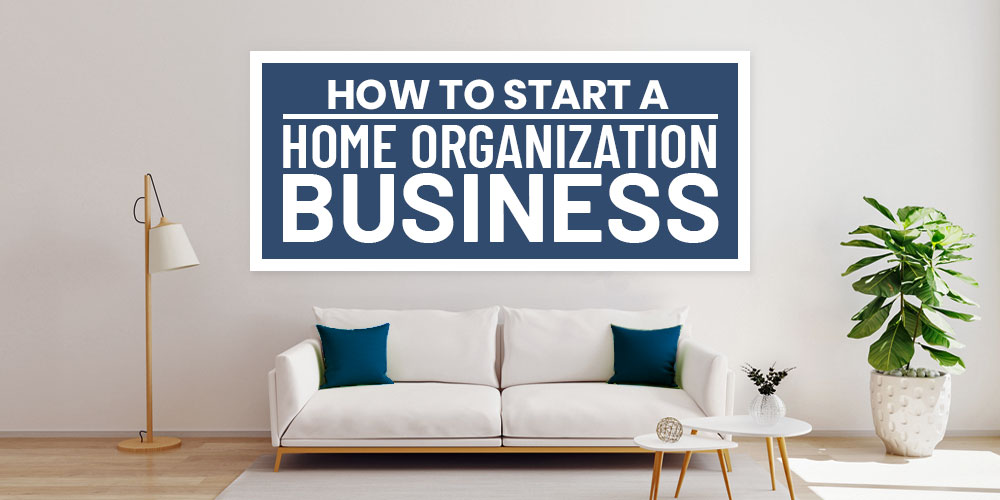
Hi, I’m Ryan
As an avid minimalist, I’ve spent a lot of time thinking about the best and most effective way to organize a home. I’ve learned many tricks of the trade over the years when it comes to professional organizing!

Is Starting A Home Organizing Business Right For You?

The idea of starting your own home organization business may feel like a pipe dream, but with a little passion and a lot of planning, you can turn that dream into a reality. When I was beginning my own tiny house business , I was starting something brand new: turning my dream into a business.
You don’t have to be a seasoned entrepreneur to make your dream work. If you have the right tools, the skillset, and the focus to take all the necessary steps, you’ve got this in the bag!

Is There A Good Market For Home Organizing Businesses?
Home organizers are in higher demand than ever before, and for good reason! As people have begun to use their house for more than just day-to-day living, the need for structure and home organization has risen. The increase in minimalist living trends has also encouraged more people to get their homes and lives in better order.
Will A Home Organizing Business Be Successful Where You Live?
If you’re wondering whether or not a home organization business will be successful where you live, your best bet is going to be to research the local home organizing industry. Find out what type of home organization services are needed most in your area, so you can determine whether your niche is a good fit.

If you want to go the extra mile, reach out to one of the business owners in your local area to see what advice they have about staking your ground in the city you live in! You’ll find it’s even helpful to talk to friends or acquaintances who are in different industries or lines of work. So long as they’re local business owners, they’ll have some valuable insight for you.
Types Of Home Organizing Businesses

There are a variety of home organization businesses out there, but the type of home organization business that you choose will dictate how you navigate everything in your business plan, from which clients you serve to how you run your organizing sessions.

Examples of different organizing businesses and specialties include
- General home organizing
- Household management
- Move management
- Paper management
- People with disabilities
- Memorabilia and collections
- Space planning and design
- Storage units
- Task and time management
- Children / Students
- Chronic disorganization
- Closets or closet design
- Clutter control
- Digital organizing
- Eco-organizing
- Estate management
- Garage, attic, or basement
- Garage or estate sales
- Hoarding behavior
- Home offices
- Home staging
It’s important to choose a niche that personally suits you, so you can really put your heart into your work. Do you love working with seniors to downsize their space , or enjoy creating workable home systems for busy moms? Your organizing business should be a reflection of who you are and what you do best.
Is A Home Organizing Business Profitable?

Whether a client needs help organizing their house, office, or studio, a professional home organizer is always a sensible way to go.

12 Steps To Starting A Home Organizing Business

If you’re ready to begin your own home organizing business, you’ll need some tools to help you get started. Quality marketing strategies, an effective business model, and a catchy name are just a few musts to get your own home organization business up and running as soon as possible.
Define What You’re Selling
It’s important that your specific home organization niche is clear both to you and the clients you serve! The first question you need to ask yourself before planning any other aspect of your business is what type of services you plan to provide.

When defining your product, be as specific as possible. You want to make your clients aware of the exact skills and services that they’ll be getting when they hire you.
Determine Your Pricing, Costs, and Profit
After identifying the specific services you want to offer, you’ll need to figure out what to charge your clients, what your supply costs will be, and your estimated profits.
To do this, make a list of each of the individual services you will offer in your business. From there, think through all of the needed supplies to achieve that service, and write down the cost of those needs. This will help you create an accurate estimate of your supply costs.
You should also account for how much time each service will take. After all, time is money ! Knowing how much time a particular project or service takes on average will help you to determine what services you can offer within a specific time frame. Which tasks will require just a single day of work, and which projects might take several days or weeks?
Potential Costs For A Home Organizing Business
- Cleaning supplies
- Storage bins, baskets, and other containers
- Label maker and labels
- Gas and transportation
- Computer, supplies, and business equipment
- Office or desk space
- Digital tools (web domain, software, apps, social media)
- Marketing tools (graphic design, business cards, logo)
- Legal services
- Hiring and paying employees

Once you have a general idea of what your supply costs will be, you’ll be able to create a rate that makes sense for you and your business. You might assume that a flat rate is the best way to go, but there are many different ways to charge clients as a home organization business.
Home Organization Business Pricing Guide
Package rates can offer better deals for your clients the more often they book you, which can be a smart business strategy. An hourly rate can be financially wiser, as projects that take longer will earn you more money. Using a fixed rate can be easier when it comes to budgeting and keeping track of your finances .
Overall, there isn’t one way to go that’s better than the other. It really just depends on what makes the most sense for you and the way you want to run your business.
Determine Which Tasks You’ll Need To Outsource
It’s unlikely that you will be able to handle every aspect of your business entirely on your own. One of the business strategies I always lean on is hiring others to do the tasks I either don’t have the skills to do or really don’t want to handle alone.

Then, make a list of the skills you don’t have and the tasks you absolutely do not want to handle, and think through the type of worker you’ll need on your team to fill in these gaps.
Payroll and accounting are some of the most common tasks that small business owners choose to outsource. It also might be a smart idea to hire out for marketing or graphic design so you can focus on what you do best: organizing your clients’ homes.
Validate Your Idea With A Business Model Template
Developing a successful business model is key for any successful business venture. Especially in this kind of business, you want to make sure you have all of your ducks in a row. Being prepared and put together for a client is crucial to establishing a positive relationship, especially in the business of organizing.
Using a pre-established business template is a wise move when starting anything new. It’ll help you keep your ideas in order and figure out the exact plan you should follow to make your business a success.
A Business Template Should Include The Following Items
- Potential or established partnerships
- Cost structure
- Value propositions
- Revenue streams
- Customer relationships
- Customer segments

Develop A Savvy Business Plan
After filling out your home organization business template and creating a preliminary plan, it’s time to lean into developing your own business plan and identify your goals . The purpose of the business plan is to iron out the concrete details to support the higher brow concepts that you’ve already identified in your business template.v
A Successful Business Plan Should Include The Following Elements
- Business summary
- Company description
- Marketing plan
- Products and services
- Strategy and implementation
- Financial plan and projections
- Policies and procedures

A business plan for a home organizing business will likely look similar to any other business plan, but with the specifics geared toward your niche. Your business plan should help you define the intricate details of your business like how much to charge, how to track your clients, and more.

Come Up With A Name That Sticks
Every business needs a catchy name. Your company name is the first thing potential clients will associate with you and your product. It’s the backbone of your reputation as a company — no pressure!

Be sure to look up whether or not your business name has already been taken by checking with the United States Patent and Trademark Office .
Create Your Own Website
Good news: you don’t have to be a tech wizard to create a website. Your website doesn’t have to include all the bells and whistles, it just needs to be effective at communicating what you do and telling customers how to get in touch or schedule a service. You can use a website builder and set yours up in an afternoon.
Small Business Website Builders
- Squarespace
- Google Sites
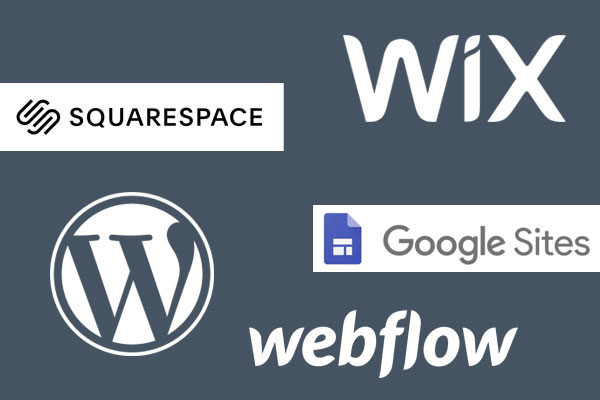
Consider creating your own domain name to pair with your new site. Websites with URLs like thetinylife.wix.com or thetinylife.wordpress.com look significantly less professional than thetinylife.com, so buying a domain name is money well spent.
Where To Buy A Domain Name For Small Business
- Google Domains

Once you’ve officially made your business an online home, don’t forget to add or claim your business profile on Google , so searchers can easily find you.
Get Your Finances Straight For Your Home Organizing Business
It’s important to have a firm grasp on your finances when starting a small business of any kind. I won’t claim to be an expert on financial management, but I do think I’ve learned a ton over the past decade about what to and what not to do when managing money for a small business.

Go In With A Plan

The Rule Of Three

One rule of thumb that I always work by when it comes to calculating and keeping track of my own profit is the rule of three. When broken down, the rule of three is a pretty simple one to follow.
Be Smart About Your Budget

A Budget Can Help You With The Following
- Spend wisely
- Manage sales
- Understand true costs of your business
- Plan cashflow
- Handle payroll
- Make appropriate tax deductions
- Avoid or reduce debt
- Create a rainy-day fund

Gather Supplies For Home Organizing
Before you kick things off, make sure you’re fully equipped with everything you’ll need. The list of tools and supplies that most home organizing businesses needs isn’t a terribly long one, but it includes things for cleaning, creating an organizing system, and taking care of yourself.
Bags And Storage
Bags and various storage solutions are the cornerstone to home organizing. Large storage bins, clear bins, and assorted bag sizes are going to be crucial. The bins will help you create places for all items to live in an organized fashion, while the bags will be perfect for both storing and hauling away items.
Storage solution stores and big box stores are the best places to buy bins for a home organizing business. You’ll be able to buy your supplies in bulk, at the best prices.
Labeling Supplies
As you’re sorting, organizing, and putting everything in its place, labels are going to be your best friend. Not only will they help you keep track of what you’re working with, but they’ll also help create a system that’s easy for the homeowner to keep up with. Markers, labels, and a label maker are must-haves.
Simple Tools
Scissors, screwdrivers, pliers, and box cutters are going to help you cut through mess and put the world back together as you organize.
Personal Protective Equipment
Start Building Your Client Base
Creating a business alone is not enough to make the clients flood in. In fact, the reality is, no one is going to use your home organization services unless you find strategies to make them notice you. No matter how big or small you’re starting, these are some good ways to start building clientele.
Lean On Friends And Family
Ask people close to you if you can organize a space in their home or office for them and use the experience as a resume builder. Don’t forget to take high-quality before and after photos!
Collect Good Reviews
Those organizing guinea pigs can also leave you honest reviews on Google, social media, and your website. As you go forward, always ask your customers to write reviews. Whether you’ve been in business for a week or five years, good reviews keep your business looking relevant and active.
Create Content
Create some content that shares organizing strategies that you’ve used in your own home or with friends and family. This content can be anything from social media posts to blog articles to organizing tip sheets.
Showcase your skills and that portfolio of before and after photos on your social media and website to attract potential customers. A strong and active social media presence is a must for home organizers, because it’s the best way to show off the before and after photos of your freshly clean and organized homes. Facebook, Instagram, Pinterest, and TikTok are all popular platforms for home organizers.
Share The Love
Market Your Home Organizing Business Strategically
The approaches that work to help you establish your client base can also keep it growing. But once you’re established, there are a few other ways you can market your home organizing business.
Ways To Market Yourself As A Small Business
- Encourage word-of-mouth referrals
- Offer discounted services to early or regular clients
- Post signs or flyers around your neighborhood or community where allowed
- Get featured in local media, showcasing your service
- List your business on referral sites (NAPO, Find my Organizer, Angie, Thumbtack)
- Host organizing workshops in your community or online
- Attend networking events
- Pay for online ads
Turn Your Organizing Business Into A Legal Entity
Filing your business as a legal entity is one of the best ways to not only make your business official but validate your credibility within your trade. Deciding how or whether to register your home organizing business is complicated, and depends greatly on where you live, how big your business is, and how serious you are about growth.
Most small business owners file either as a sole proprietorship or a limited liability corporation (LLC) .

You’ll likely want to open a small business bank account so you can accept payments and keep your business finances straightforward and easy to track. One notable downside to filing as a sole proprietorship is that you aren’t able to separate your personal assets from your business liability.
In contrast, if you file as an LLC, your business liability is entirely separate from your personal assets (and you’ve got to prove that to the IRS). An LLC also provides more flexibility when you’re ready to scale and grow your business in the future. However, filing as an LLC is more complicated in terms of keeping up with paperwork and taxes.
When establishing your home organizing business as an LLC, each state will have different individual requirements, so make sure you read into the specifics of your state. It’s also a wise move to look into getting business insurance as an LLC.
Make Your Business Stand Out With Certification

Bonus: Define Professional Partnerships To Achieve Your Goals
Now, here’s where I’ll make my pitch! At the end of the day, any small business is far more successful when it has established professional partnerships.

Working with The Tiny Life as part of your marketing can help promote your business, bring new clients to your door, bring credible awareness to your company, and get you to your sales goals faster.
We’ve done it time and time again with our partners to great effect. I love helping new business owners promote their passions. Please feel free to reach out so we can talk about how we might work together!
Tips For Starting A Home Organizing Business

At the end of the day, your integrity and the way you handle challenges and obstacles as a business owner will matter a lot more than having a fancy logo or catchy title. The most successful businesses are the ones with good leaders, and any tips I have to give about business management stem from strengthening your leadership and thus, strengthening your team.
Know Your Strengths And Limitations
Understanding the strengths and limitations of your team is crucial to being an effective leader. The best way to lead a business is to recognize the strengths of the team that you already have and place them in positions that cater to those strengths. It’s equally as important to recognize the initial weaknesses of your team and have compassion and understanding for them, while also helping them work to improve.
Welcome Failure, Then Get Back To Work
If you’re new to the small business game, it’s likely that you might feel a sense of pressure to be perfect at what you’re doing from the get go. However, I encourage you to welcome failure. In my experience, failure is a more productive tool for the success of a business than nailing everything on your first try.
Don’t Forget To Enjoy What You Do And The Impact You Make
I have come across far too many business owners who forget why they started doing the work they do in the first place. You should continue to find joy in the work you do , even as your business grows and challenges arise. The entrepreneurial path won’t be all sunshine and rainbows. However, it’s crucial that you remain in tune with the reason you started your business in the first place.

Books That Can Help You Get Started And Stay Motivated

There are books and other resources than can help you successfully kick start your home organization business. Below are some of the books that I would recommend.
Starting A Home Organization Business Books
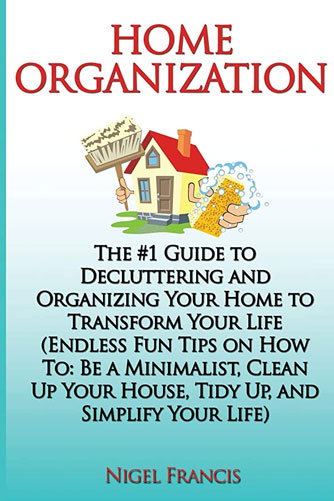
Home Organization: The #1 Guide To Organizing Your Home
by Nigel Francis
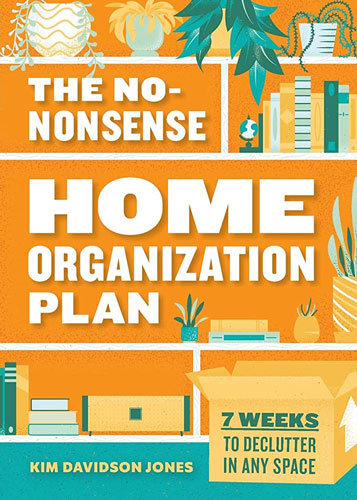
The No-Nonsense Home Organization Plan
by Kim Davidson Jones

Organized Living: Solutions and Inspiration for Your Home
by Shira Gill

The $100 Startup
by Chris Guillebeau

The 1-Page Marketing Plan
by Allan Dib
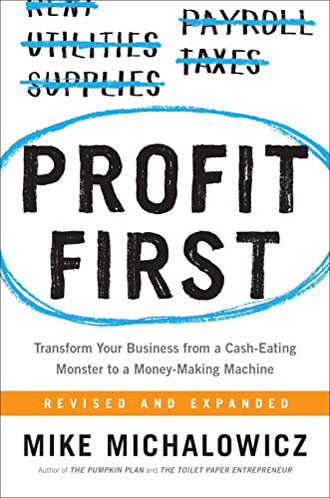
Profit First
by Mike Michalowicz
- What strategies will make your home organization business flourish?
- What long-term goals do you have for your business?
Leave a Reply Cancel reply
name (required)
email (will not be published) (required)
Notify me of follow-up comments by email.
Notify me of new posts by email.
How to start a business from home
Learn about different ways of starting a home business, with a step-by-step guide to make your home business a reality.

What kind of business can you start doing at home?
Past research has shown over two-thirds of new business start off in the home. Whether you’re looking for a side hustle, a full-time job or to become an entrepreneur, there is a home business idea for you.
Popular businesses to run from home include creative fields (copywriting, content writing, graphic design), IT (web design, developing apps) and ecommerce (handmade products, drop shipping , selling products on marketplaces such as Etsy).
A home-based business is any business where your own home is the principal place of business.
You may need to check the laws in your location for starting a home business, as some places control this via zoning regulations. If you’ll have business visitors in your home, you may also want to familiarise yourself with laws about safety and liability insurance.
How to start your own business from home: a step-by-step guide
- Develop your business idea
- Write a business plan
- Create a financial plan
- Decide on a name, business entity and legal structure
- Set up the business licence and bank account
- Set up your home office
- Set up small business accounting
- Create a marketing plan
1. Develop your business idea
The first step is to determine what type of business you want to start. If you don’t have any obvious ideas, try the following:
Choose a home business idea that fits your talents and skills
Do you have years of experience or qualifications to use to your advantage? Do you have a special talent? For example, if you are good at baking, you might consider a home baking business, or you might be specifically interested in making homemade cookies.
Find ideas you are passionate about
Does the business idea excite you? If you are wildly excited about your business, you’ll have more energy and focus.
Make sure your idea is viable and that you can make money from it
Not every talent or skill can become a successful business idea. You’ll need to make a plan to turn your idea into revenue. You can begin by researching the market – and your potential competition.
Consider if you can run your idea from home
You'll need to think about zoning laws. For example, if you want to run a catering business, you may not be allowed to, but you may be able to run a home baking business. Home bakeries are cottage industries and are permitted to make low-risk foods; catering businesses can produce high-risk foods and require more regulation and facilities that may not be allowed in a residential area.
When you’re brainstorming ideas, don’t discard anything. Your ideas are allowed to be wild or simple.
Once you’re satisfied that you can pour your energy and skill into it and make a financial return from it, you’re ready for the next step.
2. Write a business plan
Small business experts like accountants and bookkeepers say it really helps to have a plan. Even if it’s a really short one.
Your plan will describe your product or service, identify who will buy it and why, and explain how those purchases will filter down into profits for you.
Start with a one-pager
Begin with a simple one-page business plan. Keeping it short will help you focus on what’s important – plus it'll help make sure you actually finish the plan.
Besides answering big questions about your product and how it fits into the market, a plan will also cover practical things like funding needed, sales goals, marketing plans, and who your team will be.
Download a one-page business plan template .
3. Create a financial plan
A financial plan will help you understand how your business will make money. Hint: it probably won’t be profitable straight away so definitely budget for a lean beginning.
Your budget will estimate costs and income to help you understand when the business might become profitable. It'll also help you see if you need to borrow some cash to make things happen.
Learn about small business budgeting .
You’ll need to strike a balance between affordability for the customer and profitability for you.
Get the scoop on common pricing strategies .
How will you pay for everything? Do you need a loan (or investment) to start up your business?
Find out how small business finance really works .
How to pay yourself
Work out what you can afford to pay yourself. And learn how to do it without getting a surprise tax bill. Quick reality check: most small business owners only take modest pay to begin with.
Figure out how to pay yourself.
4. Decide on a name, business entity and legal structure
After you’ve written your business plan, you will want to name your business. That’s if you’re not going to operate under your own legal name. When deciding, it’s a good idea to make it memorable and something that makes it clear what you do.
Check that your chosen name is available. Start with a simple Google search to see if the name is taken. And also check the intellectual property office .
There are several different ways to make your business name official:
- Trading name: This allows you to trade with a name other than your own. This doesn’t give you legal protection, but can help distinguish different areas of your business if you want to sell certain products or services under a separate name.
- Trade mark: This protects your business name, goods and services at the national level.
- Domain name: This protects your business web address.
You'll also need to choose a suitable business structure. This can affect how you’re taxed and how much you’re personally liable for the business.
There are four main types of structure to consider:
- Sole trader
- Partnership
- Limited liability partnership
- Limited company
The government will automatically assume you’re a sole trader unless you choose to be something else. To choose the correct entity for your business, consult with an accountant.
Related articles : Types of business structure explained and Registering a business
5. Set up the business licence and bank account
You’ll need a UTR number from HMRC. This is a tax number that will identify your business with HMRC. Depending on your business status, you might have a UTR number as an individual, as well as a separate UTR number for your business entity. You may also have to apply for VAT registration with HMRC .
After you have completed your business and tax registrations, you may need to apply for a business licence depending on your industry. These are generally issued by local authorities. Some common licences include:
- Home occupation licence: If you’re planning to get lots of customers or deliveries or advertise outside your home you may need to get permission with your local council.
- Alcohol licences: You’ll need to check what local licences apply to you if you’re planning to sell or supply alcohol. It’s likely you’ll require a premise based and personal licence.
- Food business registration: If you’re planning to prepare and sell food you’ll have to register for this licence for each of your outlets, with the corresponding local authority.
It’s a good idea to review your home-based business insurance needs. Typical insurance includes home coverage, public and professional liability, key person and shareholder.
Related article: Registering a business and VAT guide for business
6. Set up your home office
Designate a specific area or room that will be your home workspace. Consider if you need any extra room for inventory or work tools.
Try to keep your workspace as distraction-free and roomy as possible. Being stuck in a noisy spot or a cramped corner will diminish your productivity.
Once you have your space, invest in suitable furniture, tools and technology. You may not be able to afford everything you’d like all at once, so rank things in order of priority.
Related article: Practical tips for a mobile office
7. Set up small business accounting
Once all your registrations, licences and permits are arranged, you should open a dedicated business bank account. This is crucial for bookkeeping and tax filing because it prevents confusion between your personal and business finances.
Record receipts for all your business purchases as you may be able to deduct them from your taxes. Also keep records of all your sales. List all of these incomings and outgoings together in one place so you can see how the business is doing.
Get a tax advisor onboard as soon as you can. They will help you claim all the deductions you’re entitled to and submit an accurate return. Plus they’ll do things like estimate your tax bills so there aren’t any nasty surprises.
Related article: An intro to small business accounting
8. Create a marketing plan
Writing a marketing plan can help you define your marketing strategy and identify the best channels to market your products or services.
To create your marketing plan, you should:
Analyse the market
Do a SWOT (strengths, weaknesses, opportunities, threats) analysis to determine where your business fits in the market.
Set your goals and objectives
Make them SMART (specific, measurable, achievable, relevant, time-bound).
Outline your marketing strategies
Choose marketing activities to suit your target audience. For example, will you reach them online ?
Set your marketing budget
Knowing how much you have to spend is critical to the success of any marketing campaign.
Keep your marketing plan up to date
Analyse your campaigns and tweak or change your plan as needed. Track how much business you get in return for each pound spent. When you see something isn’t working, invest your money and energy in other ideas.
Useful marketing tools for home-based businesses include setting up social media accounts and a website.
How to start an online business from home
Starting an online business is easier than ever. They generally cost less to run and are easier to run as a side hustle. Plus, online businesses give you the flexibility to work from anywhere and access to a worldwide market.
Learn the pros, cons and how-to’s in the guide to starting an online business .
Overcoming possible barriers to setting up a home business
All new business owners face barriers. Resilience and planning will help to solve many problems that you'll face. Some common barriers include:
- Lack of financial resources: Be sure you can afford to start a business and meet your regular expenses. Consider taking a loan or partnering with someone if you need to.
- Regulations and red tape: Ensure you obtain the correct permits and licences to run your business from home. Consult with experts to help you understand requirements.
- Interruptions from family and friends: You need to establish boundaries so that your family or friends know not to interrupt you during business hours . You also need to avoid working around the clock just because you happen to live in your office.
- Feeling isolated: You may feel lonely working on your own. Join some professional groups and try working in a shared space or café occasionally.
Resources and tips for running a successful home business
Setting up a home-based business is difficult. The following resources can help you run a successful home business.
- Business plan template – download this free template (with a how-to guide) to help put your idea together.
- Cash flow forecast template – use this free template to track expected costs against your cash reserves to help see if you need a loan.
- Small business trends – check out this stat-packed report on the issues affecting small businesses around the world.
Xero does not provide accounting, tax, business or legal advice. This guide has been provided for information purposes only. You should consult your own professional advisors for advice directly relating to your business or before taking action in relation to any of the content provided.
Start using Xero for free
Access Xero features for 30 days, then decide which plan best suits your business.
- Included Safe and secure
- Included Cancel any time
- Included 24/7 online support
Or compare all plans

- Houzz Pro Learn
- Business Management
- Contractors
How to Start a Homebuilder Company: All Your Questions Answered
Get your building business off the ground with this comprehensive guide

If you’re considering how to start your own homebuilding company, look no further. Here we share 14 steps to do just that, explaining each in detail. Whether you want to learn how to start a custom homebuilding business or you want to work with more typical designs, this guide will give you a solid foundation for success.
Click one of the links below to jump to the section you’re most interested in:
- Identify your niche
- Conduct market research
- Write a builder business plan
- Name your building company
- Decide on a business entity type
- Register your business
- Get building licenses and permits
- Get builder insurance
Set up your business to receive and send funds
- Get funding
- Set up your office
- Build your team
- Choose homebuilder business software
- Find your first client

How to identify your home building niche
The first step in figuring out how to start a housebuilding business is to decide which niche to pursue. This way you can select the types of projects that best suit your skillset and your new business’ goals. There are four main niches:
- Tract/production: This involves building clusters of homes (dozens to hundreds) in a single neighborhood, typically with a set number of floor plans and design features for buyers to choose from. A model home is often shown to potential buyers, and price is often the deciding factor for buyers.
- Speculation (aka spec): This involves buying a parcel of land and building a house or houses before finding a buyer. The builder determines the floor plan before breaking ground, but if clients buy in before the work is finished, they might be able to choose finishes and appliances.
- Custom: This involves working with the client to build a unique home based on his or her wishes and local regulations, with complete flexibility regarding the architecture and features. Custom builders also can do renovations and add-ons.
- Luxury: In this sector, the homes are generally custom, given the higher budget. But whether the home is custom or not, the architecture is generally more distinctive than for the typical home, and the finishes, appliances and other elements are high end. Artisans might even be brought in to create show stopping components, such as artful gates, stairway railings and tilework.
Consider also the possible specialties within any of the above categories. “Green” or sustainable construction is popular, as is the kitchen-and-bath niche.

How to conduct builder market research
When you’re learning how to start a homebuilding company, it’s imperative to conduct research in certain areas so you’re not just guessing at what clients want and what the local economy and region will support. To make it easier, focus on each area individually. For example:
- Your intended market (both geographical and in terms of specialty)
- Competitors
- The local client base
- Local building trends
It’s not hard to do this research on your own, thanks to all the resources out there. All you need is a computer and the knowledge of where to look. For instance:
- The U.S. Small Business Administration (SBA) offers lots of information on conducting market research and doing competitive analyses and much more in its Business Guide for general businesses.
- The National Association of Home Builders (NAHB) offers many resources including info on industry news , economic analyses , and more.
- The U.S. Bureau of Labor Statistics (BLS) lets you search typical salary ranges and other economic info
- Put out questionnaires and surveys on social media or mailing lists. This is a great way to find out what people really want. You can also join relevant social media groups and get plenty of info without even posting.
- Do an internet search for “residential construction companies + [your area]” to find competitors. Once you’ve identified them, you can check out their websites and social media to see what types of homes and projects are locally popular and what the typical price ranges are.
Attend industry events and/or search their websites as well as other industry websites for published findings. For instance, Houzz offers a number of regularly updated research reports and IBISWorld offers data on industry trends .

How to write a homebuilder business plan
A solid builder business plan is essential for long-term success. Not only will it help you shape your goals and make sure you have enough capital to realize them, but bank lenders and investors will want to see it as part of their research. It doesn’t have to be long and complex to be effective, either. And while charts and graphs can be helpful and in conveying info and giving your plan a professional appearance, they aren’t strictly necessary. But your homebuilder business plan should include the following at a minimum:
- Executive summary: Summarize your business through a bio, goals, and mission statement. Include the niche you chose earlier. This can be just one or two pages.
- Company overview: Describe the founder(s), share your values statement and what makes your company different, and specify the type of business entity (we’ll explain that later).
- Market analysis: Use the research you did in the previous step to show a clear demand and how your company can satisfy it.
- Business structure: More detail about the type of business entity, including whether there are shareholders, what the organizational layout looks like, and the current or planned number of employees.
- Products and services descriptions. Will you offer eco-friendly solutions, for example? Will you focus on a certain style of home, such as modern or traditional? You can also include how you’ll charge for your services (lump sum, unit price, or cost plus) and if you have any existing relationships with developers, subcontractors or suppliers.
- Marketing and sales plan: Include what types of platforms you’ll have a presence on (Houzz is a great one, of course), advertising you’ll be using, any existing email lists, any other ways you’re planning to reach potential clients, and how you’re planning to turn leads into clients.
- Financial plan: Included projected income and expenses, cash flow forecasts, and any debt obligations (investments, loans, and so on).
Note that the components above are the same whether you’re creating a custom homebuilder business plan or a business plan for a building company that works only with fixed designs.

How to name a homebuilding business
This is actually often the first thing people wonder when they’re figuring out how to start a homebuilding company. And it’s worth some serious thought, given that a name is important in terms of conveying your identity as well as in branding , creating a memorable customer impression and maximizing your firm’s appearance in internet search results. Your market research will help you come up with a name that will draw clients, and you can either get creative or take a more straightforward approach using just your name and/or the types of projects you’ll be focusing on (for example, Custom Traditional Homes by Carl). Ideally the name should indicate what your business is, but your own full name alone might be fine if you’ve already built a reputation.
Important: Do a trademark search and also a general internet search to make sure you’re not infringing on someone else’s name either legally or informally. Even if a business doesn’t hold official rights to a name, it can cause confusion among customers if you have the same or a similar name.
Feeling stuck or uninspired? Do an internet search for “building business name generator” for ideas.

What is the best business entity for a homebuilding company?
It’s helpful to consult a tax professional for this, because each entity type has its own tax implications and reporting requirements. However, a sole proprietorship is not recommended, as it exposes you to personal risk (see below).
- Sole proprietorship: This is the simplest type of business entity, but it offers little protection and no special tax benefits. Your business is under your own name and social security number. If you get sued or owe any debt, your personal assets (home, car, and the like) will be on the line.
- LLC (limited liability company): You get certain asset protections and can choose to be taxed as a partnership or a corporation. Reporting requirements and tax calculations are generally not too onerous. Note, however, that not all states recognize LLCs.
- C Corp: The business is a separate taxable entity, and the owners and shareholders have limited liability because of that. It involves several reporting requirements as well as holding regular meetings. One plus is that you can sell stock in the entity to raise capital.
- S Corp: This is technically a tax status rather than an entity type. So, for instance, your business can be an LLC that’s taxed as an S Corp. It can result in tax savings depending on profit amounts, but also has reporting and other requirements — for example, there must be fewer than 100 shareholders.
As mentioned above, you’ll include the chosen entity type on your builder business plan.

How to register a homebuilding company
If your company is a sole proprietorship in your own name, this might not be technically necessary, but it’s still important as you’re working out how to start a housebuilding business to register it as a legal entity to get certain liability protections, legal benefits and tax deductions. The registration requirements for a homebuilding company are the same as or similar to the requirements for other types of businesses; for most small businesses, you just need to register your business name with the local and state governments.
First get a federal tax ID number (TIN) or employer tax ID number (EIN) through the IRS . You’ll need it for paying taxes, hiring staff, opening bank accounts, getting loans and applying for business licenses.
LLCs registration is handled at the state level, but corporations need to file with the federal government, again through the IRS (see Form 2553 ). Then you also need to register with state and possibly local governments; consult the SBA and local government websites to find out your locale’s requirements.

How to get builder licenses and permits
If you’re just beginning your research on how to start a homebuilding business, you might not be aware that you need licenses and permits. But they’re 100% necessary! Without them, your business could be subject to fines or other penalties and even closure. Every state has different requirements, so it's important that you check in with your state’s agency as well as know all the building codes for your state and city.
What are permits? Permits are evidence of permission granted at the state and/or local level for, among other things, hauling certain types or sizes of materials, or if your vehicle is overweight or oversize.
What are licenses? Licenses are granted for operating the business itself. In most states, you’ll need at least a general contractor’s license. If you’ll be doing a specialty service such as carpentry, painting, electrical, roofing or HVAC work, you might need a specific license for that as well.
You can check what licenses and permits are needed and apply for them on the SBA website as well on other government websites.

What insurance does a builder need?
You might be wondering, do builders need insurance? Definitely! Taking out a few kinds of insurance policies not only is often required by the project agreement, but it will help you protect your business in the event of accidents, lawsuits and more. There are four main types to consider:
- General liability. This covers work-related bodily injury (to subcontractors, clients, vendors etc.) and property damage; the specifics of what’s covered are unique to the particular insurance policy. Note that it does not cover the cost of repairing defective work.
- Professional liability. This insurance is often taken out by homebuilders who are also architects or engineers, as it protects businesses from financial liability for design issues.
- Builder’s risk. This is for anyone with a financial interest in the home being built, and it typically covers the property on the jobsite in the event that it is damaged or completely ruined by fire, wind, vandalism, vehicle collisions or other accidents. Some builder’s risk policies also cover construction materials stored at another location.
- Commercial auto. This is coverage for company-owned vehicles used for work-related purposes, and is similar to what many people carry for their personal autos. It can protect light, medium, and heavy-duty vehicles, and you can take out a policy for just one vehicle or several, as well as add on vehicles personally owned by employees that they use for work.
You might also be required to purchase worker’s compensation insurance, which is helpful to have even if it’s not required; it pays workers in the event that they are injured on the job. Consider also inland marine (aka equipment) insurance, which covers any property that might be moved, including tools and equipment.

Think about not just how clients will pay you but how you’ll pay vendors, subcontractors and any employees. First you’ll need a dedicated business bank account, which requires a TIN or EIN (see above). Be sure to check any fees that will be charged; most business bank accounts have a minimum monthly service charge, and some charge for every check deposited or financial transfer as well. If you’ll be taking credit card payments, you’ll also need to get set up with a payment processor (tip: Houzz Pro allows you to take both credit card and ACH payments online ).
In addition, decide which billing method(s) your business will use and study up on how to price your construction jobs so you turn a healthy profit.

How to get funding for a homebuilder business
Funding sources should be included in your builder business plan, and it’s essential to make sure you always have enough working capital to cover the amounts you’ll need to lay out for materials and supplies, office overhead, and payments due until the client pays you. Luckily, there are a number of sources to possibly tap as you figure out how to start a homebuilding company.
SBA and other small business loans. While they can be hard to get and require lots of paperwork, SBA loans are a great option to try for due to their low interest rates and generous terms. Three of the most common are:
- 7(a) loan program: Up to $5 million, and can be used for a variety of business-related purposes.
- Microloans: Up to $50,000 and can be repaid over as many as six years.
- CDC/504 loans: Up to $5.5 million for purchasing fixed assets such as heavy machinery. Can be repaid over 10 or 20 years.
Many lenders both locally and nationwide offer small business loans as well. You can find out about these via internet search; be aware that terms can vary widely.
- Working capital loans: To cover day-to-day expenses such as office rent and payroll. These include lines of credit through a financial institution.
- Vendor financing: Individual vendors may offer short-term financing/payment plans at varying interest rates, generally between 1% and 6%; be sure to read the fine print on the terms of repayment.
- Equipment loans: For purchasing machinery; the amount loaned must go directly to the cost of the machinery. The equipment’s value serves as collateral, so this is a good option if you have no other collateral or a not-ideal credit score.
Tip: Networking can be a great way to get advice about financing from those who have “been there, done that.” Check out our handy guide to networking in construction for ideas.
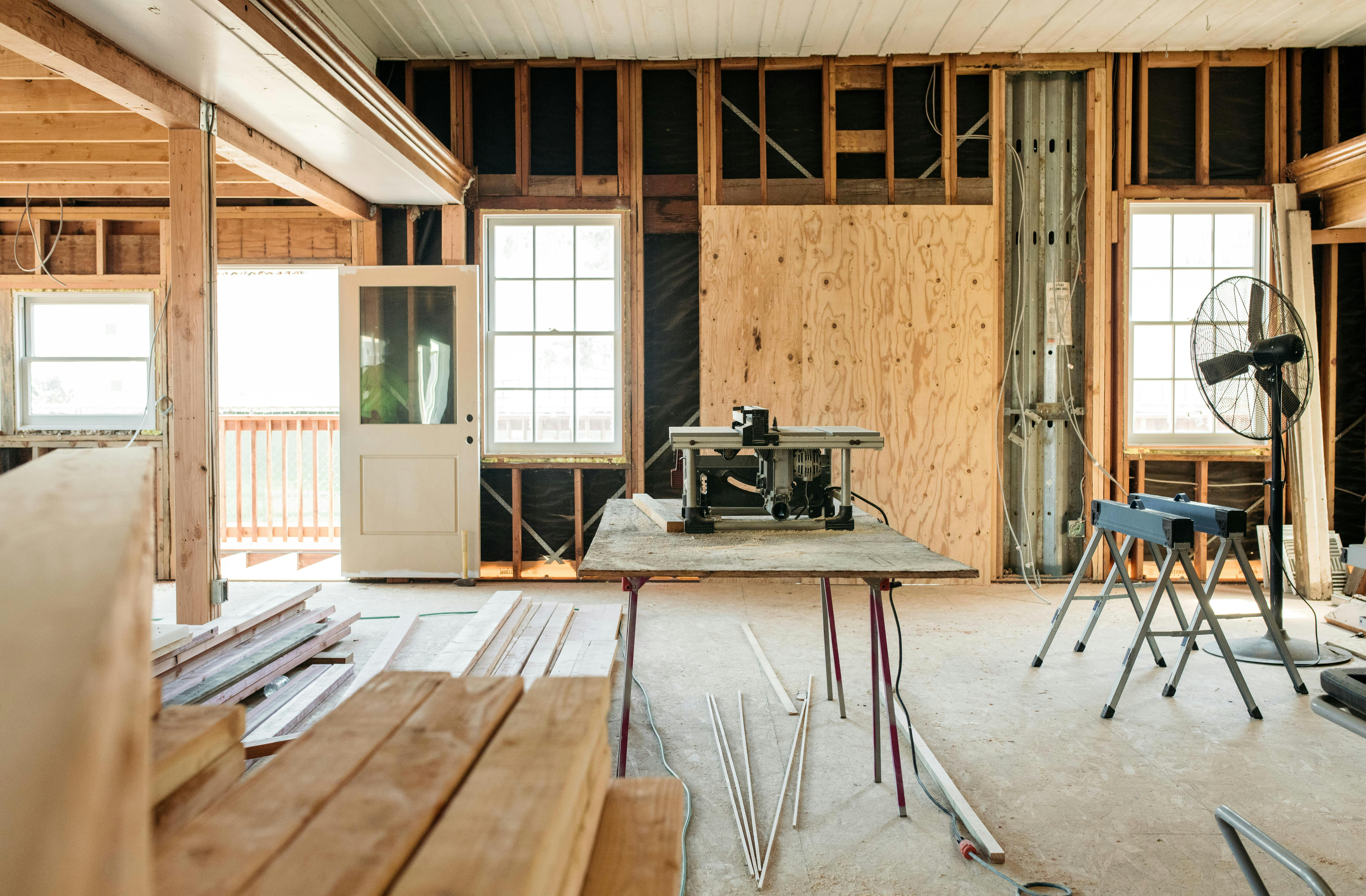
How to set up an office for your homebuilding company
While it might be tempting to save money by working from home, a dedicated office confers an air of legitimacy and acts as a place where you can easily meet clients, investors and others involved in your business. You can also set aside a portion of it for holding material samples, project models and other bulk items.
- Pick the best geographical location. Ideally it will be convenient for both you and anyone who visits. Consider your commute time, local traffic and the parking situation.
- Consider office style. Remember that everything the client sees creates an impression. And if your company focuses on modern housing, for example, setting up in an old Victorian mansion might send mixed messages. Make sure the setting is professional-looking and creates a trustworthy image as well as fits your brand.
- Research costs. You should account for rent or leasing costs in your builder business plan, and make sure that you can afford them. You might have to trade a favorable location for something that works with your budget.
- Ensure security. If you’re not in a building with a guard and/or an alarm system, set up your own security system. Keep in mind that while your files might not be worth dollars to a thief, you’ll be working with clients’ sensitive financial information, and it’s worth protecting.
- Furnish it. At a minimum, you’ll need a desk and chair for you and somewhere else for others to sit, plus a filing cabinet and some general storage. As you might be working on how to start a homebuilding company on a shoestring, check out secondhand stores and local online resale websites such as Craigslist. Add at least a bit of decor too, including any framed certificates of training or printed accolades.
- Equip it. If you work only on a laptop and use your cell phone, you’ll likely still need a printer, some good task lighting for your desk and perhaps a paper shredder for sensitive documents.

How to build your team
1. Decide what roles to fill
Your team might be small to start, but you’ll need at least a project manager to oversee the construction and development of the homes; a home dealer, who will handle pre-project client-related tasks such as selling the homes; and the subcontractors who will do the actual work. Aside from those, you’ll likely need to bring some or all of the following on staff or hire them on a freelance basis:
- Construction foreperson
- Equipment manager
- Superintendent
- Bookkeeper/accountant
2. Interview candidates
Building the right team requires interviewing people thoroughly to make sure they’re:
- Truly interested
- Trustworthy
- A good fit in terms of personality, values and work ethic
See our articles on common construction titles and how to recruit for your team for more info.
3. Keep your employees happy
Job satisfaction is just as important as good pay for many people, so make sure to keep the lines of communication open and listen to what your employees and contractors need. Be flexible when you can and offer opportunities for advancement. See our article on how to retain construction talent for ideas.
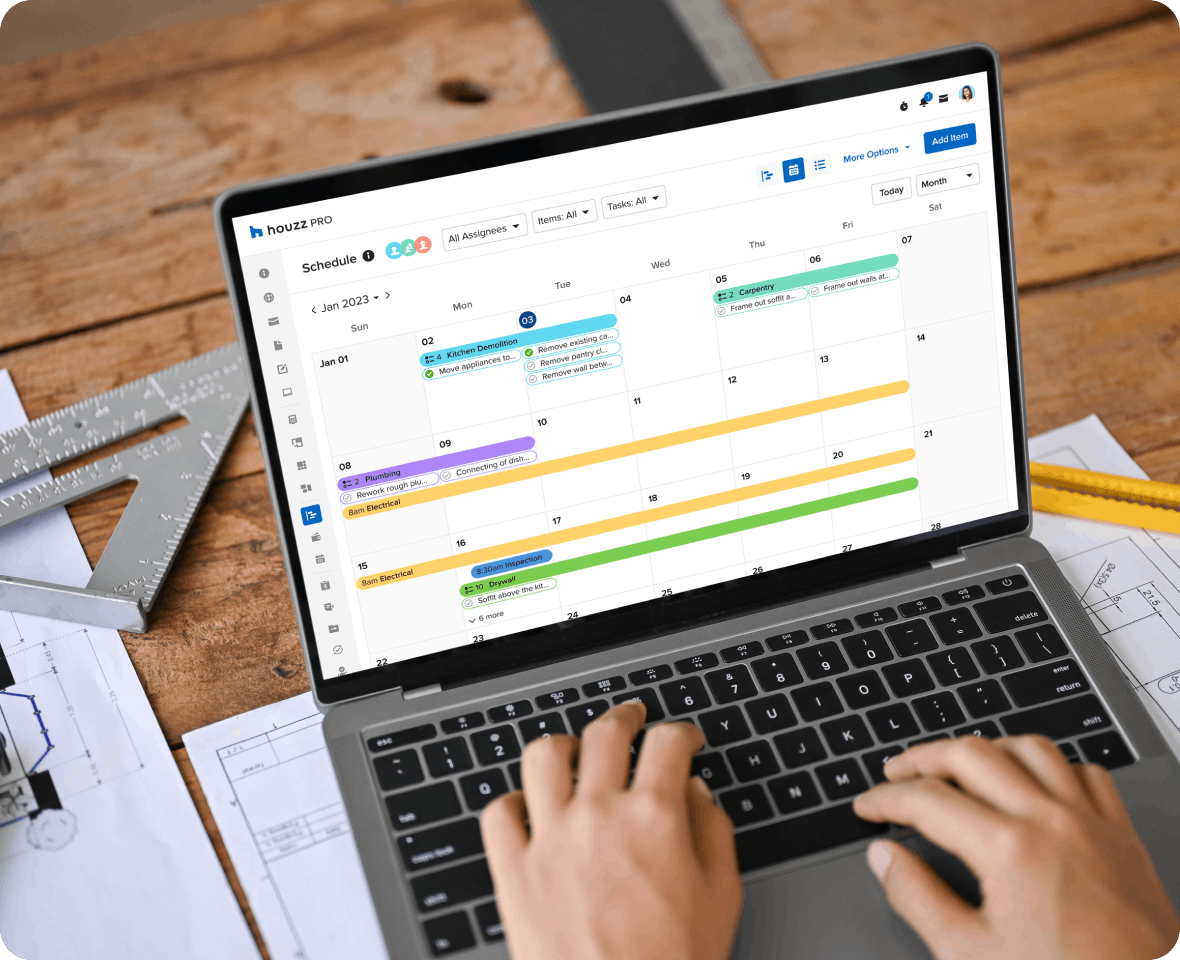
How to choose builder business management software
The right software won’t just make your job easier; it’ll help you organize and follow up with leads, increase the accuracy of all of your calculations, let you easily analyze your business’ finances and keep your clients and team members in the loop. So as you’re working out how to start a homebuilding business, consider that investing in software will pay for itself in the long run. Look for something that can help you with everything from organizing to taking payments. It’s especially important that the software is easy to adopt (that is, it has a low learning curve) and that it includes:
- Tools for creating takeoffs and estimates
- Features that promote collaboration
- Cloud-based storage and other features
The ability to use the software on a mobile device also is essential, so you can work whether you’re in the field or at a desk. For home builder software , you can’t beat Houzz Pro, which has all of these features and capabilities and more. Try it free today to put your new construction business on the path to success!

How to find your first builder lead
Getting the word out about your new business is mission critical for the long-term success of your business. And even when you start landing clients, you want to keep focusing on bringing in new clients so you always have a steady stream of work. Our guide to getting leads for a residential construction business is a great place to start; it covers digital marketing, networking, getting referrals and more. Also check out our articles dedicated to:
- Social media marketing
- Email marketing
- Advertising
- Increasing sales

Conclusion: ‘Should I start a homebuilding company?’
By now you should have a pretty good idea of the answer to that question. Even if you’re excited to get started right away, take some time to think it all through instead of just rushing in. Research all of the next steps involved in the actual work too so that you’re comfortable with what’s required. For instance, learn all about the construction project workflow . And talk with booth new and veteran builders to get their take — there’s no substitute for personal experience!
First Month is on Houzz
You’re just a couple clicks away from activating your time-saving, client-winning, project-tracking business hub.
Houzz Pro is the all-in-one tool for marketing, project and client management built specifically for remodeling, build, and design professionals.
Join the conversation by commenting or asking a question below. The Houzz team reads every single comment, and we’ll get back to you by email if you need us!

Want advice delivered to your inbox?
Unlock industry insights and updates for contractors and design pros
By signing up, I agree to the Houzz Terms of Use and Privacy Policy and that Houzz may use my information to contact me about relevant content, products, and services.
More From Houzz Pro Learn
BUSINESS MANAGEMENT
Pro Advice Gems for Your 2024 New Year’s Resolutions
Contractor's guide to pet safety on construction sites, consultations: fee or free.

Tax Credits for Homebuilders and Remodelers

Top Liabilities for Remodeling Businesses in 2023

What Do Homebuilders Do? The Complete Career Guide

PRO SUCCESS STORIES
Homebuilder Roy Maor Cements His Stellar Reputation

Home Remodeler John MacDougall Gets Down to Business

HOUZZ PRO NEWS
How to Take Your Remodeling Business to the Next Level

Get the industry-specific content you really want sent directly to your inbox—just sign up below!
How to Write a Home Business Plan
- Home Business
- Small Business
- Online Business
- Entrepreneurship
- Operations & Success
Mindy Lilyquist is an experienced marketing professional. She is the founder and creative director of Epiphany Marketing Management, serving small businesses since 2007.
You are ready to finally get all the information and ideas tumbling around in your head onto paper. It is time to take your ideas, plans, and market research and write a home business plan.
What Is a Home Business Plan?
Here's a quick comparison. An absurdly complicated swing set is delivered to your home. Not only do you get a book of instructions, but also a DVD of instructions. After many hours spent studying that book and DVD, you successfully create the coolest swing set ever. There is no way you could have built that swing set without those instructions.
A business plan is just like a book of instructions. It establishes a route to create a successful and profitable business. Trying to set up a business without some instructions is a recipe for wasted time mingled with disaster.
A business plan is a traditional business document analyzing a business' operation plan, market, and financials.
Why You Need a Plan
- A business plan is required if you seek outside funding from investors or a financial institution.
- A tangible business plan gives you the ability to stay focused and on track. You can always refer back to your business plan to realign or reevaluate the plans you have made (and you should!).
- A business plan is a useful tool to recruit key talent or individuals you may need in order to get your business off the ground.
- A business plan offers the final gut check on whether or not your business is feasible .
There are two types of business plans, formal or informal. If you seek funding, banks or investors will require a formal business plan of 10-30 pages. A formal business plan adheres to the traditional business plan outline and typically requires a more substantial financial section.
An informal business plan is usually for internal purposes and does not need to follow the traditional business outline as stringently. For a small business interested in creating a simple and informal business plan? Touch on all the sections in the business plan outline, but especially focus on the marketing analysis, SWOT analysis, and marketing plan section.
You have a few choices when it comes to actually creating the document. You can do it the good ol' fashioned way, hire someone to do it for you or use an awesome online business plan tool like enloop to assist in the creation process.
Where possible, try writing the business plan on your own, at least a first draft. Not participating in this process could rob you of the knowledge and insight you’d gain during the research and compilation phase. If seeking outside funding, you may want to seek outside help. This could ensure each section is covered properly and increase your chances of getting funding. Whether you decide to write the business plan in its entirety or not, make sure and recruit some help to review and proofread your final document.
Traditional Business Plan Outline
Here is an example of a traditional business plan outline. Remember, if you are creating a formal business plan in order to secure funding, you will want to adhere to this outline. If you are creating an informal internal business plan, it is okay to veer slightly from this outline as you deem necessary.
Each section is linked to further instructions for that area of the business plan outline.
- Executive summary: This is the “cliff-notes” version of your business plan. Try to keep it to one or two succinct pages. You will write this section last.
- Market analysis section: This section will illustrate your knowledge in three specific areas: your industry, target market and competitive environment. Remember all that market research you compiled? This is where it will pay off. Industry overview: Trends, threats, major players, growth rates, sales data.
- Target market profile: Demographics, geographic location, profile, how needs are or are not being met.
- Competitive analysis: Direct and indirect competitor profiles, including what they do well and poorly.
- Company description: This section is where you introduce your business and its primary product and goals. Basically, who you are, what you do, and why you will do it well. Here you will also describe your basic operations, including physical location and product manufacturing process.
- SWOT analysis: A concise one- to two-page section outlining the strengths, weaknesses, opportunities, and threats facing your business.
- Marketing plan: An outline on your sales plan, pricing model, advertising strategies and communication plan.
- Organization plan: A summary on how your business structure (e.g. LLC, sole-proprietor), required management/employees, and anticipated payroll expenses.
- Financials: This section can be one of the most stressful to create. Be patient and seek out help if you need it. Items in this section will include a balance sheet, income statement, breakeven analysis, and statement of cash flows. You will also include your request for funding if seeking loans or an investment.
- Appendix: Here you will include relevant and supporting documentation for your business plan. This could include some of your market research findings, case studies, physical property agreements, resumes, and more.
- Important Marketing Skills That Employers Value
- How to Create a Coffee Shop Business Plan
- Business Plan Help for the Overwhelmed Small Business Owner
- 37 Home Business Ideas
- 9 Critical Steps to Writing a Business Plan
- 10 Questions You Need to Answer to Create a Powerful Marketing Plan
- Important Business Skills for Workplace Success
- What Is a Marketing Plan?
- How to Write a Business Plan for a Pet Business
- What Type of Business Plan Do You Need?
- How to Develop the Marketing Strategy for Your Home Business
- 4 Time-Saving Hacks for Creating a Comprehensive Marketing Plan
- Turn Your Hobby into a Home Business
- Grants and Loans to Help Fund Your Music Career
- How to Write a Food Truck Business Plan
- How to Write a Restaurant Business Plan

Group Home Business Plan Template
Written by Dave Lavinsky

Over the past 20+ years, we have helped over 1,000 entrepreneurs and business owners create business plans to start and grow their group home companies.
If you’re unfamiliar with creating a group home business plan, you may think creating one will be a time-consuming and frustrating process. For most entrepreneurs it is, but for you, it won’t be since we’re here to help. We have the experience, resources, and knowledge to help you create a great business plan.
In this article, you will learn some background information on why business planning is important. Then, you will learn how to write a group home business plan step-by-step so you can create your plan today.
Download our Ultimate Business Plan Template here >
What Is a Business Plan?
A business plan provides a snapshot of your group home business as it stands today, and lays out your growth plan for the next five years. It explains your business goals and your strategies for reaching them. It also includes market research to support your plans.
Why You Need a Business Plan
If you’re looking to start a group home business or grow your existing group home company, you need a business plan. A business plan will help you raise funding, if needed, and plan out the growth of your group home business to improve your chances of success. Your group home business plan is a living document that should be updated annually as your company grows and changes.
Sources of Funding for Group Home Businesses
With regard to funding, the main sources of funding for a group home business are personal savings, credit cards, bank loans, and angel investors. When it comes to bank loans, banks will want to review your business plan and gain confidence that you will be able to repay your loan and interest. To acquire this confidence, the loan officer will not only want to ensure that your financials are reasonable, but they will also want to see a professional plan. Such a plan will give them the confidence that you can successfully and professionally operate a business. Personal savings and bank loans are the most common funding paths for group home companies.
Finish Your Business Plan Today!
How to write a business plan for a group home business.
If you want to start a group home business or expand your current group home business, you need a business plan. The guide below details the necessary information for how to write each essential component of your group home business plan.
Executive Summary
Your executive summary provides an introduction to your business plan, but it is normally the last section you write because it provides a summary of each key section of your plan.
The goal of your executive summary is to quickly engage the reader. Explain to them the kind of group home business you are running and the status. For example, are you a startup, do you have a group home business that you would like to grow, or are you operating a chain of group homes in your business?
Next, provide an overview of each of the subsequent sections of your plan.
- Give a brief overview of the group home industry.
- Discuss the type of group home business you are operating.
- Detail your direct competitors. Give an overview of your target customers.
- Provide a snapshot of your marketing strategy. Identify the key members of your team.
- Offer an overview of your financial plan.
Company Overview
In your company overview, you will detail the type of group home business you are operating.
For example, you might specialize in one of the following types of group home businesses:
- Faith-based Group Home: In this type of group home business, you may specialize in adding spiritual support courses and counsel to the residence group home experience.
- Boutique Group Home: If you are opening a boutique group home, you will want to offer distinctive, personalized services that appeal to your target audience. Offerings may include massage treatments, herbal wraps, nutritional supplements and counseling for the small group of guests in your boutique group home.
- Senior Group Home: This type of group home business is focused on guests who are aged 65 years and older. Guests may attend classes on health and safety for seniors, as well as receive medical treatment and recovery options. Classes are small and residences are typically small in size. On-call medical care may also be offered.
- Teen & Young Adult Group Home: Offering select group homes to teens and young adults offers a marketing advantage, as most teens will opt for this environment. Guests are engaged in physical activities, including dances and outdoor activities, as well as circle therapy groups, medical oversight and rooms that sleep up to four teens or adults.
In addition to explaining the type of group home business you will operate, the company overview needs to provide background on the business.
Include answers to questions such as:
- When and why did you start the business?
- What milestones have you achieved to date? Milestones could include the number of guests served, the amount of revenue during the past six months, opening a second group home location, etc.
- Your legal business structure. Are you incorporated as an S-Corp? An LLC? A sole proprietorship? Explain your legal structure here.
Industry Analysis
In your industry or market analysis, you need to provide an overview of the group home industry.
While this may seem unnecessary, it serves multiple purposes.
First, researching the group home industry educates you. It helps you understand the market in which you are operating.
Secondly, market research can improve your marketing strategy, particularly if your analysis identifies market trends.
The third reason is to prove to readers that you are an expert in your industry. By conducting the research and presenting it in your plan, you achieve just that.
The following questions should be answered in the industry analysis section of your group home business plan:
- How big is the group home industry (in dollars)?
- Is the market declining or increasing?
- Who are the key competitors in the market?
- Who are the key suppliers in the market?
- What trends are affecting the industry?
- What is the industry’s growth forecast over the next 5 – 10 years?
- What is the relevant market size? That is, how big is the potential target market for your group home business? You can extrapolate such a figure by assessing the size of the market in the entire country and then applying that figure to your local population.
Customer Analysis
The customer analysis section of your group home business plan must detail the customers you serve and/or expect to serve.
The following are examples of customer segments: individuals, physicians, hospital placement staff.
As you can imagine, the customer segment(s) you choose will have a great impact on the type of group home business you operate. Clearly, individuals would respond to different marketing promotions than hospital staff, for example.
Try to break out your target customers in terms of their demographic and psychographic profiles. With regard to demographics, including a discussion of the ages, genders, locations, and income levels of the potential customers you seek to serve.
Psychographic profiles explain the wants and needs of your target customers. The more you can recognize and define these needs, the better you will do in attracting and retaining your customers.
Finish Your Group Home Business Plan in 1 Day!
Don’t you wish there was a faster, easier way to finish your business plan?
With Growthink’s Ultimate Business Plan Template you can finish your plan in just 8 hours or less!
Competitive Analysis
Your competitive analysis should identify the indirect and direct competitors your business faces and then focus on the latter.
Direct competitors are other group home businesses.
Indirect competitors are other options that customers have to purchase from that aren’t directly competing with your product or service. This includes on-site church programs, welfare housing assistance and drug treatment centers. You need to mention such competition, as well.
For each direct competitor, provide an overview of their business and document their strengths and weaknesses. Unless you once worked at your competitors’ businesses, it will be impossible to know everything about them. But you should be able to find out key things about them such as
- What types of customers do they serve?
- What type of group home business are they?
- What is their pricing (premium, low, etc.)?
- What sets their business apart from others?
- What are their weaknesses?
With regard to the last two questions, think about your answers from the customers’ perspective. And, don’t be afraid to ask your competitors’ customers what they like most and least about them.
The final part of your competitive analysis section is to document your areas of competitive advantage. For example:
- Will you provide options for group home visitors on a daily or weekly basis?
- Will you offer products or services that your competition doesn’t?
- Will you provide better customer service?
- Will you offer value-based pricing?
Think about ways you will outperform your competition and document them in this section of your plan.
Marketing Plan
Traditionally, a marketing plan includes the four P’s: Product, Price, Place, and Promotion. For a group home business plan, your marketing strategy should include the following:
Product : In the product section, you should reiterate the type of group home company that you documented in your company overview. Then, detail the specific products or services you will be offering. For example, will you provide a six-month extended stay group home experience?
Price : Document the prices you will offer and how they compare to your competitors. Essentially in the product and price sub-sections of your plan, you are presenting the products and/or services you offer and their prices.
Place : Place refers to the site of your group home company. Document where your company is situated and mention how the site will impact your success. For example, is your group home business located in a quiet neighborhood, a rural farming district, or an inner-city boarding house? Discuss how your site might be the ideal location for your customers.
Promotions : The final part of your group home marketing plan is where you will document how you will drive potential customers to your location(s). The following are some promotional methods you might consider:
- Advertise in regional medical periodicals and/or magazines
- Reach out to physician websites
- Distribute direct mail pieces to your target audience
- Engage in email marketing
- Advertise on social media platforms
- Improve the SEO (search engine optimization) with target keywords on your website
Operations Plan
While the earlier sections of your business plan explained your goals, your operations plan describes how you will meet them. Your operations plan should have two distinct sections as follows.
Everyday short-term processes include all of the tasks involved in running your group home business, including answering calls, planning and stocking group home items, paying invoices, contacting customers, etc.
Long-term goals are the milestones you hope to achieve. These could include the dates when you expect to admit your 100th guest, or when you hope to reach $X in revenue. It could also be when you expect to expand your group home business to a second or third location.
Management Team
To demonstrate your group home business’ potential to succeed, a strong management team is essential. Highlight your key players’ backgrounds, emphasizing those skills and experiences that prove their ability to grow a company.
Ideally, you and/or your team members have direct experience in managing group home businesses. If so, highlight this experience and expertise. But, also highlight any experience that you think will help your business succeed.
If your team is lacking, consider assembling an advisory board. An advisory board would include 2 to 8 individuals who would act as mentors to your business. They would help answer questions and provide strategic guidance. If needed, look for advisory board members with experience in managing a group home business or successfully running a small motel.
Financial Plan
Your financial plan should include your 5-year financial statement broken out both monthly or quarterly for the first year and then annually. Your financial statements include your income statement, balance sheet, and cash flow statements.
Income Statement
An income statement is more commonly called a Profit and Loss statement or P&L. It shows your revenue and then subtracts your costs to show whether you turned a profit or not.
In developing your income statement, you need to devise assumptions. For example, will you serve 10 guests per day, and/or offer group home experiences with amenities? And will sales grow by 2% or 10% per year? As you can imagine, your choice of assumptions will greatly impact the financial forecasts for your business. As much as possible, conduct research to try to root your assumptions in reality.
Balance Sheets
Balance sheets show your assets and liabilities. While balance sheets can include much information, try to simplify them to the key items you need to know about. For instance, if you spend $50,000 on building out your group home business, this will not give you immediate profits. Rather it is an asset that will hopefully help you generate profits for years to come. Likewise, if a lender writes you a check for $50,000, you don’t need to pay it back immediately. Rather, that is a liability you will pay back over time.
Cash Flow Statement
Your cash flow statement will help determine how much money you need to start or grow your business, and ensure you never run out of money. What most entrepreneurs and business owners don’t realize is that you can turn a profit, but run out of money and go bankrupt.
When creating your Income Statement and Balance Sheets be sure to include several of the key costs needed in starting or growing a group home business:
- Cost of medical care, medical supplies, and administrative staff
- Cost of furnishings or accessories
- Payroll or salaries paid to staff
- Business insurance
- Other start-up expenses (if you’re a new business) like legal expenses, permits, computer software, office supplies and equipment
Attach your full financial projections in the appendix of your plan, along with any supporting documents that make your plan more compelling. For example, you might include your group home location lease or a list of associates who are already lined up to refer guests to your business.
Writing a business plan for your group home business is a worthwhile endeavor. If you follow the template above, by the time you are done, you will truly be an expert. You will understand the group home industry, your competition, and your customers. You will develop a marketing strategy and will understand what it takes to launch and grow a successful group home business.
Group Home Business Plan FAQs
What is the easiest way to complete my group home business plan.
Growthink's Ultimate Business Plan Template allows you to quickly and easily write your group home business plan.
Where Can I Download a Group Home Business Plan PDF?
You can download the group home business plan pdf here.
Our sample group home business plan pdf allows you to see the key sections to complete in your plan and the key questions that each must answer. The business plan pdf will definitely get you started in the right direction.
How Do You Start a Group Home Business?
Starting a Group Home business is easy with these 14 steps:
- Choose the Name for Your Group Home Business
- Create Your Group Home Business Plan
- Choose the Legal Structure for Your Group Home Business
- Secure Startup Funding for Your Group Home Business (If Needed)
- Secure a Location for Your Business
- Register Your Group Home Business with the IRS
- Open a Business Bank Account
- Get a Business Credit Card
- Get the Required Business Licenses and Permits
- Get Business Insurance for Your Group Home Business
- Buy or Lease the Right Group Home Business Equipment
- Develop Your Group Home Business Marketing Materials
- Purchase and Setup the Software Needed to Run Your Group Home Business
- Open for Business
Don’t you wish there was a faster, easier way to finish your Group Home business plan?
OR, Let Us Develop Your Plan For You
Since 1999, Growthink has developed business plans for thousands of companies who have gone on to achieve tremendous success. Click here to see how Growthink’s business plan advisors can give you a winning business plan.

.css-s5s6ko{margin-right:42px;color:#F5F4F3;}@media (max-width: 1120px){.css-s5s6ko{margin-right:12px;}} Join us: Learn how to build a trusted AI strategy to support your company's intelligent transformation, featuring Forrester .css-1ixh9fn{display:inline-block;}@media (max-width: 480px){.css-1ixh9fn{display:block;margin-top:12px;}} .css-1uaoevr-heading-6{font-size:14px;line-height:24px;font-weight:500;-webkit-text-decoration:underline;text-decoration:underline;color:#F5F4F3;}.css-1uaoevr-heading-6:hover{color:#F5F4F3;} .css-ora5nu-heading-6{display:-webkit-box;display:-webkit-flex;display:-ms-flexbox;display:flex;-webkit-align-items:center;-webkit-box-align:center;-ms-flex-align:center;align-items:center;-webkit-box-pack:start;-ms-flex-pack:start;-webkit-justify-content:flex-start;justify-content:flex-start;color:#0D0E10;-webkit-transition:all 0.3s;transition:all 0.3s;position:relative;font-size:16px;line-height:28px;padding:0;font-size:14px;line-height:24px;font-weight:500;-webkit-text-decoration:underline;text-decoration:underline;color:#F5F4F3;}.css-ora5nu-heading-6:hover{border-bottom:0;color:#CD4848;}.css-ora5nu-heading-6:hover path{fill:#CD4848;}.css-ora5nu-heading-6:hover div{border-color:#CD4848;}.css-ora5nu-heading-6:hover div:before{border-left-color:#CD4848;}.css-ora5nu-heading-6:active{border-bottom:0;background-color:#EBE8E8;color:#0D0E10;}.css-ora5nu-heading-6:active path{fill:#0D0E10;}.css-ora5nu-heading-6:active div{border-color:#0D0E10;}.css-ora5nu-heading-6:active div:before{border-left-color:#0D0E10;}.css-ora5nu-heading-6:hover{color:#F5F4F3;} Register now .css-1k6cidy{width:11px;height:11px;margin-left:8px;}.css-1k6cidy path{fill:currentColor;}
- 22 types of business objectives to meas ...
22 types of business objectives to measure success

Clear business objectives help you achieve your mission statement and long-term company vision. These objectives can range from financial objectives to organization specific objectives. Take a look at 22 types of business objectives you can set—plus, learn when to use business objectives vs. 14 other goal frameworks.
Whether you work at a small business, a start up, or as a team lead at a larger enterprise, as a key business owner, you’re responsible for identifying the business objectives that will help your organization hit its long-term goals. Setting goals and strategic objectives is the best way to know where you’re going and how to get there.
In this article, learn about 22 different types of business objectives and how to make them achievable. Then, take a look at the 15 different types of goals you can set, depending on why you’re setting those goals.
What is a business objective?
Business objectives are the results you are aiming to achieve in order to accomplish your longer-term company vision. Think of business objectives as metrics to measure your overall business success.
Hitting your business objectives means you’re on the path towards achieving larger company goals. As such, business objectives should focus on large-scale organizational impact. Good business objectives are measurable, specific, and time-bound.
22 types of business objectives
Set business objectives based on factors that measure and impact your organization’s success. For example, you might set the following business objectives:
Financial business objectives
1. Profitability: A profitability-focused business objective is important if your company is relying on outside investors. Achieving—and maintaining—profitability ensures your long-term success so you can make progress towards your overall company mission.
2. Revenue: Revenue-focused business objectives help you balance your income with your costs in order to stay in business. You might set business objectives to achieve a certain annual revenue goal, or to increase revenue by a certain percentage over a period of time.
3. Costs: Costs refer to how much money you’re spending on your business. Reducing costs can help you increase revenue and achieve profitability. Business objectives related to cost can help you control production or operations cost to improve your business’s financial performance.
4. Cash flow: Cash flow refers to the money moving into and out of your business. Cash flow can be positive—when you’re making more than you’re spending—or negative—when you’re spending more than you’re making. Similar to profitability, a cash flow-oriented business objective can help set you up for long term financial success.
5. Sustainable growth: In order to grow as a business, you need to grow sustainably. Setting business objectives around sustainable growth can help you plan your financial projections, employee costs, and other financial considerations.
Customer-centric business objectives
6. Competitive positioning: A big element of your business strategy is thinking about how your product or service compares to others in the same market. By setting a business objective focused on competitive positioning, you can ensure your product or service reaches parity with what’s expected in the market, or use competitive positioning to outdo your competitors in a key area.
8. Customer satisfaction: In order to succeed as a business, you need happy customers. Focusing on a customer satisfaction-based business objective can help you better serve your customers. Depending on the business objective, this might focus on a customer advocacy program, a better help desk, or something similarly customer-facing.
9. Brand awareness: Your brand is what makes your organization stand out from the crowd. Brand awareness is an important way to understand how your customers think of your brand, and how aware they are of your distinct brand vs. your competitors. Understanding—and increasing—brand awareness is a key part of your long-term marketing strategy .
10. Sales: You’ll often find business objectives related to improving or refining the sales cycle. This could include anything from reducing customer acquisition cost (CAC), developing better lead tracking, increasing cross-selling, or something else.
11. Churn: In business, your churn rate refers to how many customers you lose over a set period of time. Reducing churn is a great way to increase your revenue and ensure your customers are satisfied with the product or service you provide.
Internal business objectives
12. Employee satisfaction and engagement: Part of your business is how your employees feel about working there, too. Increasing employee satisfaction and engagement leads to happier employees, reduced burnout , and more effective teams.
13. Employee retention: A key internal business objective is how long your employees spend at your company. Increasing tenure and reducing turnover can help you achieve more complex projects with knowledgeable employees.
14. Company growth: In order to grow your business, you also need to grow the number of people you employ. Growing your company sustainably can be difficult—which is why businesses often set company growth as a key business objective.
15. Organizational culture: Organizational culture is the ideals, values, and group norms that shape how team members interact within your company. Good culture drives employee engagement and increases retention, which is one of the key reasons so many companies set organizational culture-focused business objectives.
16. Change management: Smoothly implement large-scale organizational change with change management . Though you typically won’t see organizations set this type of business objective year after year, it can be a helpful objective to set if you have large changes on the horizon.
17. Productivity: At Asana, we don’t think of productivity as “doing the most you can,” but rather as a way to optimize your time and get your best work done. Increasing employee productivity can help your teams achieve their high-impact work more efficiently.
18. Employee effectiveness: Teams don’t just need to be efficient—they also need to know the right things to work on. The best companies aim for efficiency and effectiveness—which is where an effectiveness-based business objective comes into play. To learn more, read our article about the difference between efficiency and effectiveness .
19. Diversity and inclusion: A big part of a welcoming company culture is making sure your employees feel like they belong. Investing in diversity and inclusion programs can help your business be more welcoming to your current and potential employees.
Regulation related business objectives
20. Quality control: Implementing quality control measures as a business objective can help you ensure your product or services are at the level you want them to be. This in turn leads to better customer relationships and overall increase in revenue.
21. Compliance: If your business has any compliance needs to meet in the near future, setting those compliance requirements as a business objective will ensure you hit your targets on time.
22. Sustainability or waste reduction: Some businesses set business objectives to reduce waste or increase sustainability. While this may not directly impact your business, proving that you’re environmentally minded can help you reach specific audiences you’re targeting.
Which goal framework is right for you?
Figuring out exactly what type of goal you need to set can be tricky. Each goal framework is slightly different—and implementing the right one can help you achieve success.
The type of goal you set will depend on the business activities you’re running and the specific goals you have. If your goals have a set time frame, you may want to go with short-term objectives, whereas larger goals have their own unique frameworks.
If you’re not sure where to start, check out these 15 goal frameworks for different situations:
1. Business objectives: Set goals based on operating factors that impact your company’s long-term success.
2. Business plan : Also called a business strategy plan. Document your business’ goals and plan out how you’ll get there.
3. Vision statement : Set an organization-wide North Star.
4. Big Hairy Audacious Goals (BHAGs) : Set organization-sized stretch goals .
5. Company values : Align your team around core principles.
6. Strategic plan : Clarify your three to five year company goals during the strategic planning process.
7. Strategic goal : Set the goals you want to achieve by the end of your strategic plan.
8. Critical success factors : Clarify the high-level goals you need to achieve in order to achieve your strategic goals.
9. Strategic management : Execute against your strategic plan in order to achieve your company goals.
10. Business goals : Set predetermined targets to achieve in a set period of time.
11. Objectives and key results (OKRs) : Set and communicate annual company goals.
12. Key performance indicators (KPIs) : Set quantitative goals.
13. Project objectives : Share what you want to achieve by the end of a project.
14. Project deliverables : Identify a project’s output.
15. Project milestones : Mark specific checkpoints along a project’s timeline.
More goal setting resources
Clear goals are critical to keep your organization functioning. In addition to business objectives, check out our goal setting resource hub for tips on setting goals and achieving high-impact results. Then when you’re ready, get started with Asana for goal tracking. With Asana , you can connect your company goals to the work that supports them—all in one place.
Related resources

Unmanaged business goals don’t work. Here’s what does.

How Asana uses work management to effectively manage goals

Beat thrash for good: 4 organizational planning challenges and solutions

Use critical success factors to support your strategic plan
- Share full article
Advertisement
Supported by
Axios Sees A.I. Coming, and Shifts Its Strategy
“The premium for people who can tell you things you do not know will only grow in importance, and no machine will do that,” says Jim VandeHei, C.E.O. of Axios.

By Katie Robertson
In the view of Jim VandeHei, the chief executive of Axios, artificial intelligence will “eviscerate the weak, the ordinary, the unprepared in media.”
The rapid rise of generative A.I. — and its implications for how people will discover and consume news — has unsettled many media executives. Like them, Mr. VandeHei has spent the past year or so pondering how to respond.
Now he’s becoming one of the first news executives to adjust their company’s strategy because of A.I.
Mr. VandeHei says the only way for media companies to survive is to focus on delivering journalistic expertise, trusted content and in-person human connection. For Axios, that translates into more live events, a membership program centered on its star journalists and an expansion of its high-end subscription newsletters.
“We’re in the middle of a very fundamental shift in how people relate to news and information,” he said, “as profound, if not more profound, than moving from print to digital.”
“Fast forward five to 10 years from now and we’re living in this A.I.-dominated virtual world — who are the couple of players in the media space offering smart, sane content who are thriving?” he added. “It damn well better be us.”
Axios is pouring investment into holding more events, both around the world and in the United States. Mr. VandeHei said the events portion of his business grew 60 percent year over year in 2023.
The company has also introduced a $1,000-a-year membership program around some of its journalists that will offer exclusive reporting, events and networking. The first one, announced last month, is focused on Eleanor Hawkins, who writes a weekly newsletter for communications professionals. Her newsletter will remain free, but paying subscribers will have access to additional news and data, as well as quarterly calls with Ms. Hawkins.
Membership programs will next be built around Sara Fischer, a media reporter, and the business editor Dan Primack, who writes the daily Pro Rata newsletter, according to a person familiar with the company’s plans.
“I’m trying to align the company with the people who have a ton of talent: They thrive, we thrive,” Mr. VandeHei said.
Axios will expand Axios Pro, its collection of eight high-end subscription newsletters focused on specific niches in the deals and policy world. The subscriptions start at $599 a year each, and Axios is looking to add one on defense policy. The company just hired an executive, Danica Stanciu, to oversee the expansion into more policy areas. Ms. Stanciu was instrumental in growing Politico Pro, Politico’s premium subscription offering, into a thriving business.
“The premium for people who can tell you things you do not know will only grow in importance, and no machine will do that,” Mr. VandeHei said.
Part of the pivot entails a restructuring of Axios’s leadership team. Sara Kehaulani Goo, the editor in chief of the Axios newsroom, will head up the editorial side of events and running new platforms. Aja Whitaker-Moore, the executive editor of the newsroom, will be promoted to editor in chief and will oversee all published content.
“I hope the next leg of this journey can really be focused on how we take the subject matter expertise to the next level,” she said.
Axios was started in 2017 by Mr. VandeHei, a co-founder of Politico, along with Mike Allen and Roy Schwartz. In August 2022, Cox Enterprises acquired Axios in a deal that valued the company at $525 million, with its founders staying on as minority shareholders.
Mr. VandeHei said Axios was not currently profitable because of the investment in the new businesses. The company has continued to hire journalists even as many other news organizations have cut back. An Axios spokeswoman said that Axios Local now had nearly two million subscribers across 30 newsletters, and that Axios’s national newsletters had about 1.5 million.
In addition to figuring out how A.I. could change news consumption by the public, many media companies are racing to figure out how to address the ingestion of their content by A.I. chatbots. The New York Times, for example, sued Microsoft and OpenAI in December for copyright infringement, arguing that millions of articles were used, without authorization, to train the tech companies’ chatbots.
Mr. VandeHei said that while he thought publications should be compensated for original intellectual property, “that’s not a make-or-break topic.” He said Axios had talked to several A.I. companies about potential deals, but “nothing that’s imminent.”
“One of the big mistakes a lot of media companies made over the last 15 years was worrying too much about how do we get paid by other platforms that are eating our lunch as opposed to figuring out how do we eat people’s lunch by having a superior product,” he said.
Katie Robertson covers the media industry for The Times. Email: [email protected] More about Katie Robertson
I'm a lifelong Jersey girl choosing to retire in South Carolina. It's where my adult daughter is planning to live — and it's cheaper.
- Kathie Zucker, 57, lived in New Jersey her whole life, but is now moving to South Carolina.
- After visiting her daughter — who attends college in Charleston, South Carolina, she found that she liked the area.
- She especially enjoys the warmer weather, activities, and cheaper cost of living around Charleston.

This as-told-to essay is based on a conversation with Kathie Zucker, 57, and her decision to move to Charleston, South Carolina, from the New York City suburb of Butler, New Jersey. The conversation was edited for length and clarity.
I started to seriously look to move to Charleston in the fall of 2023.
Before that, my husband and I would talk about it and drive to different areas. Then we figured out areas we liked.
It's a hard decision to make. You just say to yourself, "My husband and I are entering the second phase and moving toward retirement eventually. I'm an insurance agency manager. I'm too young to retire right now, but is New Jersey where I want to eventually be? "
And the answer was no.
On top of that was the cost of living in New Jersey. The property tax situation when you retire is still significant. I mean, you're talking $9,000 a year — just increase after increase.
I've been to Charleston extensively to stay with my daughter. She transferred there from another school in Virginia. But it wasn't really on my radar as a place to retire — more so Florida, or somewhere like that.
But the more I went to visit her and the more I saw of what it offered, the more I could visualize my husband and I retiring there.
We did consider Florida , but we ruled it out. For maybe a quick minute we considered North Carolina and ruled that out. But we definitely wanted something on the seaboard here in the east.
I wanted to be closer to my daughter — and the beach
My family had vacationed in Isle of Palms, which is near Charleston, for many years. But until my daughter went to school there, I never really went down and experienced it. It's funny that's where I ended up.
I wouldn't say my daughter living there was the sole consideration for moving. Out of 10, I would probably have to say it's a seven. Wanting to be near your adult children was important for me and my husband because she's our only child. But then I think if she was in a place we definitely didn't want to be, we wouldn't move.
Related stories
If she was in Virginia, where she originally started school, we probably would have looked in that area. But if she was in Ohio, there's not a chance I'd go to Ohio.
She loves it down there, so it's a great place for her to call home.
I wouldn't say it felt like a place immediately that I could live. Being from New Jersey and living outside New York City my whole life, it's very diverse and there are a lot of different things to do.
While obviously not as big as New York, there are also things to do in Charleston. You can hike, there are cultural events in the city and also outside the city, there's an area called Summerville that also has those things. I could very much picture myself in there because of the variety of things the area has to offer.
Also the weather — no snow, none of that to deal with. The weather and being outdoors all year round. When I was younger I used to be a winter person where I liked to ski and all that. But now I like being able to enjoy life and be outside and in a mild climate with lots of activities.
Our house in South Carolina wasn't much cheaper, but we got a lot more bang for our buck
I was born and raised in New Jersey, and I was in that house for 27 years.
Opendoor purchased the home from me free and clear for somewhere around $493,000. The company then put the home on the market a couple of weeks ago and it was sold within a week to another buyer. (Editor's note: The Zillow listing says the home sale is pending for $540,000.)
We bought the house for $143,000 in 1997. It was about 1,300 square feet, ranch style, with three bedrooms and two baths.
Our house in South Carolina is in a suburb called Moncks Corner, about 30 miles from Charleston proper. The feel of the town is a lot like Butler, except with beautiful weather and palm trees. There's a huge, huge lake two miles from where the house is being built. I can get to the beach easily — the beaches are free — and I can get to the city easily.
Obviously it's not New York City, but it's still a city and just a more laid-back life. You have great food, and some entertainment.
In general, the cost of living is less there and there are far lower taxes on property and payroll.
But it's not as much in savings as you would think. That area is really booming. It's growing and there's building like crazy.
The house that we bought in Charleston was $433,000, but the square footage is more than we had in New Jersey. It's a brand-new build in a brand-new development, which goes towards the quality of life. We could not have afforded that build in New Jersey.
Altogether, there are three bedrooms and two full baths on the first floor, and then a lofted area makes it four bedrooms. So if we have guests, or my daughter comes home to live with us, it's almost like an additional self-contained space away from the main parts of the house.
It's really nice to have that area of the house that we didn't have in New Jersey, and the yard is actually a little bit bigger than we had in New Jersey.
Would we have moved here if our daughter was here? Probably not, because I hadn't been to the area. She's a senior now and an athlete, so I go down to Charleston at least four or five times a year to see her events and stay with her or in a hotel.
But I'm not so sure if, had I not had those experiences and been down there, that Charleston would necessarily have been on my list.
Watch: Was Italy's $1 home scheme worth it?
- Main content
- Skip to main content
- Keyboard shortcuts for audio player
Investigations
The va has its fix for a home loan debacle, but many vets who got hurt won't get help.

Chris Arnold

Quil Lawrence

Edmund Garcia, an Iraq War veteran, stands outside his home in Rosharon, Texas. Like many vets, he was told if he took a mortgage forbearance, his monthly payments wouldn't go up afterward. Joseph Bui for NPR hide caption
Edmund Garcia, an Iraq War veteran, stands outside his home in Rosharon, Texas. Like many vets, he was told if he took a mortgage forbearance, his monthly payments wouldn't go up afterward.
The Department of Veterans Affairs announced a long-awaited new program on Wednesday to help thousands of veterans who were left on the verge of losing their homes after a pandemic aid effort went awry.
But it appears that many who were harmed financially won't qualify to get this new help.
"The purpose of this program is to assist the more than 40,000 veterans who are at the highest risk of foreclosure," Josh Jacobs, VA undersecretary for benefits, said at a media roundtable introducing the Veterans Affairs Servicing Purchase program, or "VASP."
What senior VA officials failed to say on their call with reporters is that the VA put veterans in that tough spot in the first place. In 2022, the VA abruptly ended part of its COVID mortgage forbearance program while tens of thousands of vets were still in the middle of it — trapping them with no affordable way to get current on their loans.
VASP is supposed to fix that problem, by allowing the VA to offer these homeowners loan modifications with interest rates that are well below the market rates on regular mortgages. The VA will own mortgages itself and will offer vets who qualify a modified home loan with a 2.5% interest rate.
But not everybody who got hurt is going to qualify. Most vets who have already ended up in much more costly modified loans won't get the help.
The VA forbearance fiasco
In November, the VA halted foreclosures for all homeowners with loans backed by the VA after an NPR investigation revealed that the agency had left thousands of vets facing foreclosure through no fault of their own.
COVID mortgage forbearance programs were set up by Congress during the pandemic to help people with federally backed loans by giving them an affordable way to skip mortgage payments and then get current on their loans again.

Thousands of veterans face foreclosure and it's not their fault. The VA could help
But in late 2022, the VA abruptly ended its Partial Claim Payment (PCP) program, which had allowed a homeowner at the end of a forbearance to move the missed payments to the back of the loan term and keep the interest rate on their original mortgage.
That effectively turned a well-intentioned program into a bait-and-switch trap. Veterans say they were told before they took a forbearance that their regular monthly mortgage payments wouldn't increase and their missed payments could be moved to the back of their loan term. But after the VA scrapped the PCP program, vets were told they needed to come up with all the missed payments at once.
"Almost $23,000? How am I gonna come up with that?" Edmund Garcia asked earlier this year in an interview with NPR . Garcia is a combat veteran who served in Iraq. He bought a house in Rosharon, Texas, with a VA home loan. After his wife lost her job during the pandemic, his mortgage company offered him a forbearance.

Edmund Garcia holds a photo of himself in 2000 as a specialist in charge of handling ammunition and supplies while he was in the Army. Joseph Bui for NPR hide caption
Edmund Garcia holds a photo of himself in 2000 as a specialist in charge of handling ammunition and supplies while he was in the Army.
The VA had other loan modification options, but those essentially required a new mortgage with a new interest rate, and rates were rising sharply — from around 3% up to around 7%.
Garcia was told that if he couldn't pay back all the missed payments at once, he would have to accept a loan modification that would result in much bigger monthly bills. His old mortgage rate was 2.4%; the offer would increase that to 7.1% with payments $700 a month higher. Alternatively, he could get foreclosed on.
"I deal with PTSD, I deal with anxiety, and, you know, my heart is beating through my chest when I was having this conversation," he told NPR. "My daughter ... she's asking, 'Dad, are you OK?' "
Now it appears that any veterans who succumbed to that pressure and accepted these higher-cost loan modifications will not be able to get help through the VA's new rescue plan.
Vets pushed into high-cost loans won't get help
"If you are not in default, this program is not for you," John Bell, the director of the VA home loan program, told NPR at a press call this week. "And you have to be in default a certain amount of time."
In other words, veterans who have been making payments on these higher-cost loans are not eligible. And it's looking like that will exclude a lot of people.
Data obtained by NPR suggests that thousands of veterans ended up in modified loans with significantly higher interest rates following a mortgage forbearance.
The fine print to the VA's new program also says that if a loan was modified, the borrower has to have made payments for at least six months, and then be in default for at least three months, to be eligible.
That doesn't seem like the right approach to some policy experts.
"We definitely don't think borrowers should have to pay six months on a bad, unaffordable modification," said Steve Sharpe with the nonprofit National Consumer Law Center.
Also, the rules mean that if a veteran tried to pay a more costly loan modification for a few months, then defaulted and couldn't afford it, they wouldn't qualify.
"If they fail on an unaffordable modification, they should be able to access VASP," Sharpe said.
He thinks the VA should extend the foreclosure moratorium on VA loans, which is set to expire at the end of May, both to give the VA time to consider fixing such issues and to give mortgage companies time to gear up and reach out to homeowners.

Lawmakers move to help veterans at risk of losing their homes

Are you a homeowner who has run into problems on a COVID mortgage forbearance?
Still, Sharpe said, for those who do qualify, the VASP rescue plan should be a big help.
"It is great news that VASP has been released," he said. "It is sorely needed because people have lacked a reasonable foreclosure alternative for a long time. ... It's exciting."
VA Undersecretary Jacobs told reporters that a key difference with the new program is that the VA will hold the loans itself, rather than simply guarantee loans that are owned by investors. That's what will allow the VA to set whatever mortgage rate it wants.
"These borrowers will have a consistent, affordable payment for the remainder of their loan at a fixed 2.5% interest rate," Jacobs said.
Back in Rosharon, Texas, Edmund Garcia is wondering what happens next.

Edmund Garcia stands with his wife, Iris Garcia, inside their home, where they live with their four daughters. Iris lost her job during the pandemic and their mortgage company offered them a forbearance. Joseph Bui for NPR hide caption
Edmund Garcia stands with his wife, Iris Garcia, inside their home, where they live with their four daughters. Iris lost her job during the pandemic and their mortgage company offered them a forbearance.
"I was a little shocked to hear that I would have to qualify for this program," Garcia told NPR this week.
The VA says borrowers should work with their mortgage company and contact a VA loan technician if they need help.
In Garcia's case, he actually never accepted that more-costly loan modification. And it appears from a review of the rules that he should qualify for VASP. But there's a catch. Under the rules, he'll probably be put into a 40-year mortgage. That could end up happening to a lot of other veterans too.
"At the end I'll be 82," Garcia says. But he would still be very happy to get the help.
"This would be a huge relief for my family," Garcia says. "And it feels like it's within arm's grasp."
NPR Senior Producer Robert Benincasa contributed to this story.
- COVID mortgage forbearance
- mortgage forbearance
- VA mortgage
- VA home loan
- forbearance
We've detected unusual activity from your computer network
To continue, please click the box below to let us know you're not a robot.
Why did this happen?
Please make sure your browser supports JavaScript and cookies and that you are not blocking them from loading. For more information you can review our Terms of Service and Cookie Policy .
For inquiries related to this message please contact our support team and provide the reference ID below.

IMAGES
VIDEO
COMMENTS
File IRS Form SS-4 To Obtain an EIN. An Employer Identification Number (EIN) is needed for businesses that have employees or have excise tax reporting obligations. The process of obtaining an EIN ...
4. Register your home business. If you decide to form your business as an LLC or C corporation, you'll need to register with your state to start and run your business from home legally. The exact ...
40 best home business ideas. 1. Buy products in bulk and sell them online. When you're starting your first home business, don't reinvent the wheel. Instead, try an existing, reliable small business model, such as importing popular products in bulk and selling them individually for a profit.
Get ready to start a small business at home. Short summary. Start a successful home-based business by carefully considering the type of business, creating a comprehensive plan, obtaining necessary permits and licenses, setting up an ergonomic workspace, marketing your venture effectively, and delivering quality products or services.
2. Identify a business idea that works remotely. There are specific qualities that make for a good business idea. The idea solves a problem, shows clear market demand, and fits your goals. However, even if an idea meets the criteria above it doesn't mean it will work as a home-based business.
3. Start the legal process. Apply for your business license, set up your legal entity, and make sure you have all the proper business paperwork set up. This is the part of the process where you may consider getting the help of a small business lawyer to ensure you're setting up your business's legal entity correctly.
Starting a home-based business begins with choosing an online business model. You must decide whether to sell products, offer freelance services or join an affiliate program. Here's a step-by-step guide to help you launch a successful small business from your home office: 1. Choose your niche.
4. Register your business and get an EIN. After you choose a business structure, you'll need to register your business with state and federal governments. Select a business name, pay fees and ...
Here are 40 of the best home business ideas to consider: 1. Freelance writer. If you're a great writer, then you could make a great freelance writer. And best of all, freelance writers work from ...
A business plan can help you: Get clear on your goals. Develop a deep understanding of your market. Organize the day-to-day activities of your home business. Understand your current financial situation. Make important management and financial decisions about your home business. Set a starting point to measure growth.
While there are countless ways to start a home-based business, here are 10 of the most approachable home business ideas to consider: Sell handmade products. Purchase products in bulk and sell them online. Start a dropshipping business. Start a print-on-demand business. Purchase an existing ecommerce business.
Shopping Fees. Cost of items bought for client, plus $30-$150 per hour. Package rates can offer better deals for your clients the more often they book you, which can be a smart business strategy. An hourly rate can be financially wiser, as projects that take longer will earn you more money.
Create a financial plan. Decide on a name, business entity and legal structure. Set up the business licence and bank account. Set up your home office. Set up small business accounting. Create a marketing plan. 1. Develop your business idea. The first step is to determine what type of business you want to start.
1. Decide what roles to fill. Your team might be small to start, but you'll need at least a project manager to oversee the construction and development of the homes; a home dealer, who will handle pre-project client-related tasks such as selling the homes; and the subcontractors who will do the actual work.
Here you will also describe your basic operations, including physical location and product manufacturing process. SWOT analysis: A concise one- to two-page section outlining the strengths, weaknesses, opportunities, and threats facing your business. Marketing plan: An outline on your sales plan, pricing model, advertising strategies and ...
Group Home Business Plan Template. Over the past 20+ years, we have helped over 1,000 entrepreneurs and business owners create business plans to start and grow their group home companies. If you're unfamiliar with creating a group home business plan, you may think creating one will be a time-consuming and frustrating process.
8. Critical success factors: Clarify the high-level goals you need to achieve in order to achieve your strategic goals. 9. Strategic management: Execute against your strategic plan in order to achieve your company goals. 10. Business goals: Set predetermined targets to achieve in a set period of time. 11.
Zoning Code. Chapter 01 - General Provisions (PDF) Chapter 02 - Zoning Districts (PDF) Chapter 03 - Permitted Land Uses (PDF) Chapter 04 - Bulk and Placement Regulations (PDF) Chapter 05 - Flood Hazard Areas (PDF) Chapter 06 - Supplementary Regulations (PDF) Chapter 07 - Planned Unit Development (PUD) Option (PDF)
Online Permit Portal. External portal for City of Moscow building and planning permits. Engineering & Streets Permits. Download forms and permit applications from the Streets and Engineering Divisions.
2024 Spring Burning Season Announced. City of Moscow Fire Officials have announced spring burning season will be March 22nd - April 22nd. Open burning is allowed for garden waste, tree trimmings and brush only. The following conditions are required for open burning [. . .]
Get a home internet plan with unlimited 5G data and a WiFi device included. See our internet plan deals and find the right plan for your home needs. ... Internet Service Provider Early Termination Fee, and new Home or Business Internet service required. ISP's ETF, up to $750, paid via virtual prepaid Mastercard, which you can use online or in ...
Daniel Zoldak, vice president of Lars Andersen and Associates, Inc., points to a mock up of plans for a future The Home Depot store to answer questions from community members at a meeting at the ...
Jared Soares for The New York Times. Axios was started in 2017 by Mr. VandeHei, a co-founder of Politico, along with Mike Allen and Roy Schwartz. In August 2022, Cox Enterprises acquired Axios in ...
We bought the house for $143,000 in 1997. It was about 1,300 square feet, ranch style, with three bedrooms and two baths. Our house in South Carolina is in a suburb called Moncks Corner, about 30 ...
The next time you go shopping for a home or mobile internet plan, you're going to see a new label laying out exactly what you can expect to pay, the typical download speeds you'll get and ...
The VA has its fix for a home loan debacle, but many vets who got hurt won't get help. Edmund Garcia, an Iraq war veteran, stands outside his home in Rosharon, Texas. Like many vets, he was told ...
Apple investors reacted coolly to the news, with the stock paring earlier gains after Bloomberg reported on the robotics work. It was up less than 1% at $169.65 at the close in New York. Shares of ...